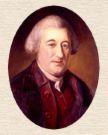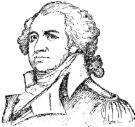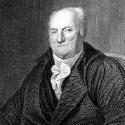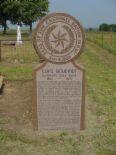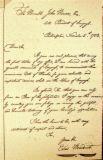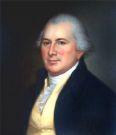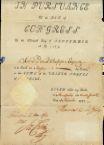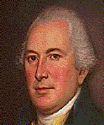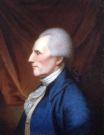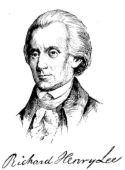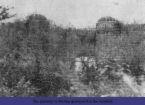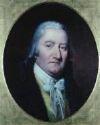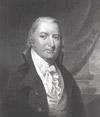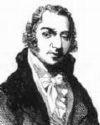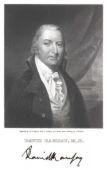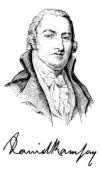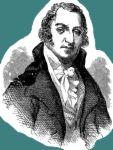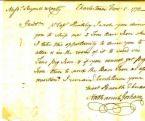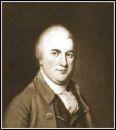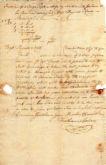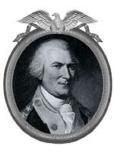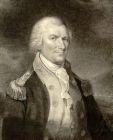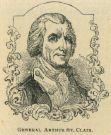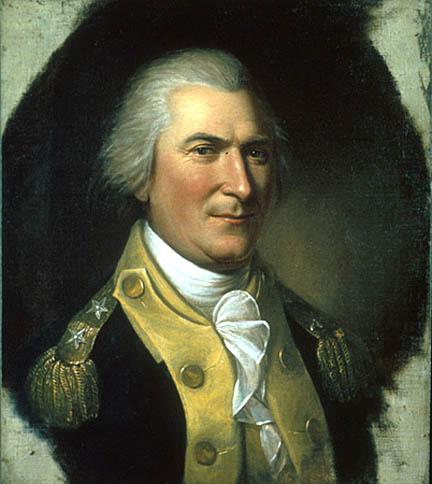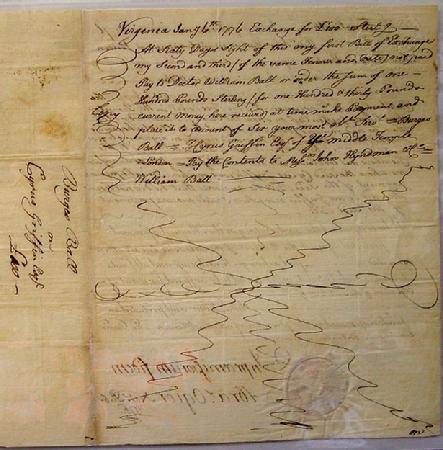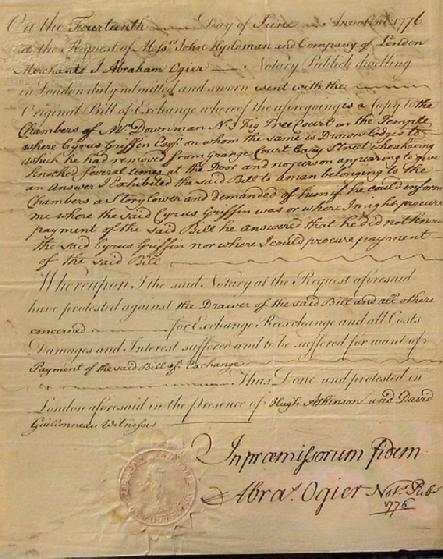|
| John Hanson
Elias Boudinot
Thomas Mifflin
Richard Henry Lee
David Ramsay
Nathaniel Gorham
Arthur St. Clair
Cyrus Griffin
|
|
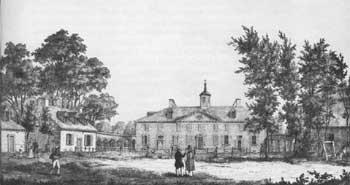 |
| Mount Vernon, probably in the 1830's, viewed from the rear, or land side. (Lithograph (undated) by P. Haas. Library of Congress.) |
|
|
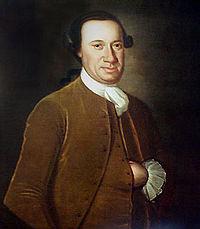 |
| Portrait of John Hanson, attributed to John Hesselius, c. late 1760s |
|
|
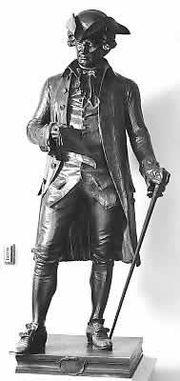 |
| The bronze statue that stands in the United States Capitol. |
|
|
|
John Hanson, American Patriot and First President of the United States
(1715-1783)
He was the heir of one of the greatest family traditions in the colonies and became the patriarch of a long line of American patriots his great-grandfather died at Lutzen beside the great King Gustavus Aldophus of Sweden; his grandfather was one of the founders of New Sweden along the Delaware River in Maryland; one of his nephews was the military secretary to George Washington; another was a signer of the Declaration; still another was a signer of the Constitution; yet another was Governor of Maryland during the Revolution; and still another was a member of the first Congress; two sons were killed in action with the Continental Army; a grandson served as a member of Congress under the new Constitution; and another grandson was a Maryland Senator. Thus, even if Hanson had not served as President himself, he would have greatly contributed to the life of the nation through his ancestry and progeny.
As a youngster he began a self-guided reading of classics and rather quickly became an acknowledged expert in the juridicalism of Anselm and the practical philosophy of Seneca both of which were influential in the development of the political philosophy of the great leaders of the Reformation. It was based upon these legal and theological studies that the young planter his farm, Mulberry Grove was just across the Potomac from Mount Vernon began to espouse the cause of the patriots.
In 1775 he was elected to the Provincial Legislature of Maryland. Then in 1777, he became a member of Congress where he distinguished himself as a brilliant administrator. Thus, he was elected President in 1781. Was John Hanson the first President of the United States?
The new country was actually formed on March 1, 1781 with the adoption of The Articles of Confederation. This document was actually proposed on June 11, 1776, but not agreed upon by Congress until November 15, 1777. Maryland refused to sign this document until Virginia and New York ceded their western lands (Maryland was afraid that these states would gain too much power in the new government from such large amounts of land). Once the signing took place in 1781, a President was needed to run the country. John Hanson was chosen unanimously by Congress (which included George Washington). In fact, all the other potential candidates refused to run against him, as he was a major player in the Revolution and an extremely influential member of Congress.
As the first President, Hanson had quite the shoes to fill. No one had ever been President and the role was poorly defined. His actions in office would set precedent for all future Presidents. He took office just as the Revolutionary War ended. Almost immediately, the troops demanded to be paid. As would be expected after any long war, there were no funds to meet the salaries. As a result, the soldiers threatened to overthrow the new government and put Washington on the throne as a monarch. All the members of Congress ran for their lives, leaving Hanson running the government. He somehow managed to calm the troops and hold the country together. If he had failed, the government would have fallen almost immediately and everyone would have been bowing to King Washington.
Hanson, as President, ordered all foreign troops off American soil, as well as the removal of all foreign flags. This was quite a feat, considering the fact that so many European countries had a stake in the United States since the days following Columbus. Hanson established the Great Seal of the United States, which all Presidents have since been required to use on all official documents. President Hanson also established the first Treasury Department, the first Secretary of War, and the first Foreign Affairs Department. Lastly, he declared that the fourth Thursday of every November was to be Thanksgiving Day, which is still true today.
The Articles of Confederation only allowed a President to serve a one-year term during any three-year period, so Hanson actually accomplished quite a bit in such little time. He served in that office from November 5, 1781 until November 3, 1782. He was the first President to serve a full term after the full ratification of the Articles of Confederation and like so many of the Southern and New England Founders, he was strongly opposed to the Constitution when it was first discussed. He remained a confirmed anti-federalist until his untimely death.
Six other presidents were elected after him - Elias Boudinot (1783), Thomas Mifflin (1784), Richard Henry Lee (1785), Nathan Gorman (1786), Arthur St. Clair (1787), and Cyrus Griffin (1788) - all prior to Washington taking office. Why don't we ever hear about the first seven Presidents of the United States? It's quite simple - The Articles of Confederation didn't work well. The individual states had too much power and nothing could be agreed upon. A new doctrine needed to be written - something we know as the Constitution.
George Washington was definitely not the first President of the United States. He was the first President of the United States under the Constitution we follow today. And the first seven Presidents are forgotten in history.
|
|
|
President of the Continental Congress |
In office
November 5, 1781 November 3, 1782 |
| Preceded by |
Thomas McKean |
| Succeeded by |
Elias Boudinot |
| Born |
April 14, 1721(1721-04-14)
near Port Tobacco, Maryland |
| Died |
November 22, 1783 (aged 62)
Prince George's County, Maryland |
| Signature |
 |
| |
Elias Boudinot
| Elias Boudinot |
|
President of the Continental Congress
|
In office
November 4, 1782 – November 2, 1783 |
| Preceded by |
John Hanson |
|---|
| Succeeded by |
Thomas Mifflin |
|---|
|
| Born |
May 2, 1740(1740-05-02)
Philadelphia, Philadelphia |
|---|
| Died |
October 24, 1821 (aged 81)
|
|---|
| Signature |
 |
|---|
Elias Boudinot (May 2, 1740 – October 24, 1821) was a lawyer and statesman from Elizabeth, New Jersey who was a delegate to the Continental Congress and a U.S. Congressman for New Jersey. He also served as President of the Continental Congress from 1782 to 1783 and Director of the United States Mint from 1795 until 1805.
Personal history
Boudinot was born in Philadelphia on May 2, 1740. His father, Elias Boudinot III, was a silversmith and a neighbor and friend of Benjamin Franklin. His mother, Mary Catherine Williams, was from the British West Indies and Boudinot's maternal grandfather was from Wales.[1] His paternal grandfather, Elie (sometimes called Elias) Boudinot, was the son of Jean Boudinot and Marie Suire of Marans, Aunis, France, a Huguenot (French Protestant) family who fled to New York about 1687 to avoid the religious persecutions of King Louis XIV. Mary Catherine Williams and Elias Boudinot Sr. were married on Aug 8,1729 and, over the next twenty years, had nine children. The first, John, was born in the British West Indies-Antigua. Of the others, only the younger Elias and his siblings Annis, Mary, and Elisha reached adulthood.
After studying and being tutored at home, Elias Boudinot went to Princeton, New Jersey to read the law with another attorney. His mentor was Richard Stockton, who later signed the Declaration of Independence, and was married to Elias's sister Annis Boudinot Stockton. In 1760, he was admitted to the bar, and began his practice in Elizabeth, New Jersey. He owned land adjacent to the road from Elizabethtown to Woodbridge Township, New Jersey.
Then, on April 21, 1762, he married Richard's sister, Hannah Stockton (1736-1808). Elias and Hannah had two children, Maria Boudinot, who died at age two, and Susan Vergereau Boudinot. Susan married William Bradford who became Chief Justice of Pennsylvania and Attorney General under George Washington. After Bradford's death in 1795, Susan came back to make her home with her father and edit his papers, which are a light into the events of the Revolutionary era. Elias's brother, Elisha, became Chief Justice of the Supreme Court of New Jersey.
In 1805, Elias moved his family to a new home in Burlington, New Jersey and lived there the rest of his life. In his later years, he invested and speculated in land. He owned large tracts in Ohio including most of Green Township in what is now the western suburbs of Cincinnati. On his death, he willed 13,000 acres (53 km²) to the city of Philadelphia for parks and city needs.
He was buried in Saint Mary's Episcopal Churchyard in Burlington.
Political career
Boudinot became a prominent lawyer and his practice prospered, As the revolution drew near, he aligned with the Whigs, and was elected to the New Jersey provincial assembly in 1775. In the early stages of the Revolutionary War, he was active in promoting enlistment and several times loaned money to field commanders for supplies. Elias also became one of the focal points for rebel spies, who were sent to Staten Island and Long Island to observe and report on movements of specific British garrisons and regiments. To this day, much of what he organized remains a "secret" worth discovery and telling.
On May 5, 1777, General George Washington asked for him to be made commissary general for prisoners. Congress through the board of war concurred. Boudinot was made a colonel in the Continental Army for this task. He held this job until other responsibilities force him to resign in July of 1778. The commissary was responsible not just for enemy prisoners, but for supplying American prisoners held by the British.
In November 1777, the New Jersey legislature named Boudinot as one of their delegates to the Second Continental Congress. His duties as Commissary prevented his attendance, so in May 1778 he submitted his resignation, and by early July he was replaced and able to attend his first meeting on July 7, 1778. He maintained his concerns for the welfare of prisoners of war throughout his term as a delegate. His first term ended that year.
In 1781, Boudinot returned to the Congress, and this term lasted through 1783. In 1783, he signed the Treaty of Paris. In November 1782 he was elected the President of the Continental Congress for a one year term. The President of Congress was a mostly ceremonial position with no real authority, but the office did require him to handle a good deal of correspondence and sign official documents.
When the United States government was formed in 1789, New Jersey sent Boudinot to the House of Representatives. He was elected to the second and third congresses as well, where he generally supported the administration, but refused to join the growing forces that led to formal political parties. In 1794, he declined to serve another term, and left Congress in early 1795. In October of 1795, President Washington appointed him the Director of the United States Mint, a position he held until his retirement in 1805. After many turbulent decades in law and politics, he was to recall the metallurgic skill learned in his father's silversmithy. He was scrupulous in his accounting, as reported to Congress, and left the US Mint in excellent order for the future.
Later public service
In addition to political office Elias supported many civic, religious, and educational causes during his life. He is intimately connected with Princeton University. In Revolutionary times, Princeton was the College of New Jersey, and Boudinot served as one of its trustees for nearly half a century, from 1772 until 1821. When the Continental Congress was forced to leave Philadelphia in 1783 while he was its president, he moved the meetings to Princeton where they met in the University's Nassau Hall.
A devout Presbyterian, Boudinot supported missions and missionary work. He even wrote "The Age of Revelation" in response to Thomas Paine's "The Age of Reason". To that end, he was one of the founders of the American Bible Society, and served as its President after 1816. He argued for the rights of black and Indian citizens, and sponsored students to the Board School for Indians in Connecticut. One of these, a young Cherokee named Gallegina Watie, stayed with him while traveling to the school. The two so impressed each other that Gallegina asked for and was given permission to use his name, and was afterward known as Elias Boudinot.
Legacy
- Elias Boudinot Elementary School in Burlington, New Jersey is named after him.
- Princeton University Library has a collection of his papers and many family possessions and portraits.
- Boudinot Street in Philadelphia, located between C and D Streets.
Quotes
- “Be religiously careful in our choice of all public officers... and judge of the tree by its fruits.”
- "Good government generally begins in the family, and if the moral character of a people once degenerate, their political character must soon follow."
References
- St. Mary's Churchyard at The Political Graveyard. Accessed August 21, 2007.
- Rick K. Wilson, Congressional Dynamics: Structure, Coordination, and Choice in the First American Congress, 1774–1789 (Stanford University Press, 1994), 76–80.
Further reading
- J. J. Boudinot; The Life, Public Services, Addresses and Letters of Elias Boudinot; New York, 1896.
- George Boyd; Elias Boudinot: Patriot and Statesman, 1740-1821; Westwood, Connecticut, 1969, Greenwood Publishing, ISBN 0-8371-1345-8.
- Joseph Lee Boyle; Their Distress is Almost Intolerable: The Elias Boudinot Letterbook, 1777-1778; 2002, Heritage Books (paperback), ISBN 0-7884-2210-3.
| Political offices |
|---|
Preceded by
John Hanson |
President of the Continental Congress
November 4, 1782– November 2, 1783 |
Succeeded by
Thomas Mifflin |
| Government offices |
|---|
Preceded by
Henry William de Saussure |
3rd Director of the United States Mint
1795-1805 |
Succeeded by
Robert Patterson |
| Presidents of the Continental Congress |
|---|
|
| First Continental Congress |
Peyton Randolph · Henry Middleton
|
|
| Second Continental Congress |
Peyton Randolph · John Hancock · Henry Laurens · John Jay · Samuel Huntington
|
|
| Confederation Congress |
Samuel Huntington · Thomas McKean · John Hanson · Elias Boudinot · Thomas Mifflin · Richard Henry Lee · John Hancock1 · David Ramsay · Nathaniel Gorham · Nathaniel Gorham · Arthur St. Clair · Cyrus Griffin
|
|
|
Thomas Mifflin
| Thomas Mifflin |

|
Continental Congressman
17741775, 17821784 |
3rd President of the United States in Congress Assembled |
In office
November 3, 1783 October 31, 1784 |
| Preceded by |
Elias Boudinot |
| Succeeded by |
Richard Henry Lee |
Speaker of the Pennsylvania House of Representatives |
In office
1785 1787 |
| Preceded by |
John Bayard |
| Succeeded by |
Richard Peters |
7th President of Pennsylvania |
In office
1778 1790 |
| Preceded by |
Benjamin Franklin |
| Succeeded by |
himself, as 1st Governor of Pennsylvania |
1st Governor of Pennsylvania |
In office
1790 1799 |
| Preceded by |
Himself, as 7th President of Pennsylvania |
| Succeeded by |
Thomas McKean |
|
| Born |
January 10, 1744(1744-01-10)
Philadelphia, Pennsylvania |
| Died |
January 20, 1800 (aged 56)
Lancaster, Pennsylvania |
| Political party |
Federalist |
| Spouse(s) |
Sarah Morris |
| Residence |
Philadelphia, Pennsylvania |
| Profession |
merchant, soldier, politician |
| Religion |
Lutheran |
| Signature |
 |
Thomas Mifflin (January 10, 1744 January 20, 1800) was an American merchant and politician from Philadelphia, Pennsylvania. He was a major general in the Continental Army during the American Revolution, a member of the Pennsylvania Provincial Assembly, a Continental Congressman from Pennsylvania, fifth President of the U.S. Congress under the Articles of Confederation, and a delegate to the Constitutional Convention of 1787. He served as Speaker of the Pennsylvania House of Representatives, President of the Pennsylvania Supreme Executive Council and the first Governor of Pennsylvania.
Early life
Mifflin was born January 10, 1744 in Philadelphia, Pennsylvania, son of John Mifflin and Elizabeth Bagnall. He graduated from the College of Philadelphia (now the University of Pennsylvania) in 1760, and joined the mercantile business of William Biddle. After returning from a trip to Europe in 1765, he established a commercial business partnership with his brother, George Mifflin, and married his cousin, Sarah Morris, on March 4, 1765. He was a member of the American Philosophical Society.
American Revolution
Early in the Revolutionary War, Mifflin left the Continental Congress to serve in the Continental Army. Although his family had been Quakers for four generations, he was expelled from the Religious Society of Friends because his involvement with a military force contradicted his faith's pacifistic nature. He was commissioned as a major, then became George Washington's aide-de-camp and, on August 14, 1775, became the army's first Quartermaster General. He was good at the job, but preferred to be on the front lines. His leadership in battle gained him promotions to colonel and then brigadier general. He asked to be relieved of the job of Quartermaster General, but was persuaded to resume those duties because Congress was having difficulty finding a replacement.
In Congress, there was debate regarding whether a national army was more efficient or if individual states should maintain their own forces. As a result of this debate the Congressional Board of War was created, on which Mifflin served from 1777 to 1778. He then rejoined the army but took little active role, following criticism of his service as quartermaster general. He was accused of embezzlement and welcomed an inquiry; however, one never took place. He resigned his commissionby then, as a major generalbut Congress continued to ask his advice even after accepting his resignation.
Political career
Prior to Independence, Thomas Mifflin was a member of Pennsylvania's Provincial Assembly (17721776). He served two terms in the Continental Congress (17741775, and 17821784). He then served in the house of Pennsylvania General Assembly (17851788).
He was a delegate to the United States Constitutional Convention in 1787, as well as a signer of the Constitution[1] . He was 5th President of the United States in Congress Assembled from November 3, 1783 October 31, 1784. One notable act as president was the signing of the ratification of the Treaty of Paris on January 14, 1784 (Ratification Day). This legislation marked the official end of the Revolutionary War and established the sovereignty of the United States.
He was a member of the Supreme Executive Council of the Commonwealth of Pennsylvania, and on November 5, 1788 he was elected President of the Council, replacing Benjamin Franklin. He was unanimously reelected to the Presidency on November 11, 1789. He presided over the committee that wrote Pennsylvania's 1790 State Constitution. That document did away with the Executive Council, replacing it with a single Governor. On December 21, 1790 Mifflin became the last President of Pennsylvania and the first Governor of the Commonwealth. He held the latter office until December 17, 1799, when he was succeeded by Thomas McKean. He then returned to the state legislature, where he served until his death the following month. Mifflin decreed that no less than six towns in Pennsylvania bear his name.
Death and legacy
Mifflin died in Lancaster, Pennsylvania, January 20, 1800. He is buried in front of Trinity Lutheran Church in Lancaster. A Commonwealth of Pensylvennia historical marker at the church commemorates both Thomas Wharton and Mifflin, the first and last Presidents of Pennsylvania under the 1776 State Constitution. The marker, dedicated in 1975, is located on Duke Street in Lancaster. His relatives live on in the area, but wish not to give their names. It reads:
Holy Trinity
Founded in 1730.
A session for an Indian treaty was held in the original church building in 1762.
The present edifice was dedicated in 1766.
Here are interred the remains of Thomas Wharton (1778) and Gov. Thomas Mifflin (1800).
Entities named after Mifflin
- Mifflin County, Pennsylvania
- Governor Mifflin School District
- Mifflinburg, Pennsylvania
- Mifflintown, Pennsylvania
- Mifflinville, Pennsylvania
- Mifflin Township, Lycoming County, Pennsylvania
- Upper Mifflin Township, Cumberland County, Pennsylvania
- Mifflin Township, Ohio
- West Mifflin, Pennsylvania
- Mifflin Hall (the main building at the US Army Quartermaster Center and School at Fort Lee, Virginia)[2]
- Mifflin Hall (dormitory at the Pennsylvania State University main campus) [3]
- Thomas Mifflin Elementary School District of Philadelphia
- Dunder Mifflin, the fictional paper distribution company, is a parody of the large number of entities named after Mifflin.
| Political offices |
Preceded by
Elias Boudinot |
President of the United States in Congress Assembled
November 3, 1783 October 31, 1784 |
Succeeded by
Richard Henry Lee |
Preceded by
Benjamin Franklin |
President of Pennsylvania
November 5, 2009 December 21, 1790 |
Succeeded by
himself
as Governor of Pennsylvania |
Preceded by
himself
as President of Pennsylvania |
Governor of Pennsylvania
December 21, 17901799 |
Succeeded by
Thomas McKean |
| Legal offices |
Preceded by
Henry Hill |
Member, Supreme Executive Council of Pennsylvania, representing the County of Philadelphia
October 20, 1788December 21, 1790 |
Succeeded by
position dissolved |
- Pennsylvania Historical and Museum Commission entry for Thomas Mifflin, accessed May 2, 2007.
- adherents.com entry for Thomas Mifflin
- Anniversaries and Holidays - p.9 by Bernard Trawicky, Ruth Wilhelme Gregory, 2000
- Minutes of the Supreme Executive Council of Pennsylvania, from its organization to the termination of the Revolution. [March 4, 1777 - December 20, 1790]. Harrisburg, Pub. by the State, 1852-53.
- Pennsylvania State Historical Marker for Thomas Mifflin
Sources
- Taffe, Stephen R. (2003). The Philadelphia Campaign 1777-1778. Lawrence, Kansas: University Press of Kansas. ISBN 0-7006-1267.
- Boatner, Mark M. III (1974). Encyclopedia of the American Revolution. New York: David Mckay Company, Inc.. ISBN 0-679-50440-0.
- Thomas Mifflin at the Biographical Directory of the United States Congress
- Rowe, G. S., Thomas Mifflin: The Shaping of an American Republican (Boulder:University of Colorado Press, 1978).
- Tinckom, Harry M., The Republicans and Federalists in Pennsylvania (Harrisburg:Pennsylvania Historical and Museum Commission, 1950): 113-134.
- Rossum, Kenneth R., Thomas Mifflin and the Politics of the American Revolution (Chapel Hill: University of North Carolina Press,, 1952).
|
|
| United States Constitution |
|
|
Baldwin · Bassett · Bedford · Blair · Blount · Brearley · Broom · Butler · Carroll · Clymer · Dayton · Dickinson · Few · Fitzsimons · Franklin · Gilman · Gorham · Hamilton · Ingersoll · Jackson · Jenifer · Johnson · King · Langdon · Livingston · Madison · McHenry · Mifflin · G. Morris · R. Morris · Paterson · C. C. Pinckney · Pinckney · Read · Rutledge · Sherman · Spaight · Washington · Williamson · Wilson |
 |
|
| Presidents of the Continental Congress |
|
| First Continental Congress |
Peyton Randolph · Henry Middleton |
|
| Second Continental Congress |
Peyton Randolph · John Hancock · Henry Laurens · John Jay · Samuel Huntington |
|
| Confederation Congress |
Samuel Huntington · Thomas McKean · John Hanson · Elias Boudinot · Thomas Mifflin · Richard Henry Lee · John Hancock1 · David Ramsay · Nathaniel Gorham · Nathaniel Gorham · Arthur St. Clair · Cyrus Griffin |
|
| Italics indicate acting presidents 1 Did not serve |
|
| Governors, Lieutenant Governors, Presidents and Vice-Presidents of Pennsylvania |
|
 |
|
|
|
Presidents
(17771790) |
Wharton · Bryan · Reed · Moore · Dickinson · Franklin · Mifflin |
|
Vice-Presidents
(17771790) |
Bryan · M. Smith · Moore · Potter · Ewing · Irvine · Biddle · Muhlenberg · Redick · Ross |
|
Governors
(since 1790) |
Mifflin · McKean · Snyder · Findlay · Hiester · Shulze · Wolf · Ritner · Porter · Shunk · Johnston · Bigler · Pollock · Packer · Curtin · Geary · Hartranft · Hoyt · Pattison · Beaver · Pattison · Hastings · Stone · Pennypacker · Stuart · Tener · Brumbaugh · Sproul · Pinchot · Fisher · Pinchot · Earle · James · Martin · Bell · Duff · Fine · Leader · Lawrence · Scranton · Shafer · Shapp · Thornburgh · Casey · Ridge · Schweiker · Rendell |
|
|
|
|
|
|
| Speakers of the unicameral Pennsylvania General Assembly (1776 - 1790) |
|
|
John Jacobs John Bayard Frederick Muhlenberg George Gray John Bayard Thomas Mifflin Gerardus Wynkoop Richard Peters |
 |
|
|
|
|
Richard Henry Lee
| Richard Henry Lee |

|
United States Senator
from Virginia |
In office
March 4, 1789 October 8, 1792 |
| Preceded by |
None; first |
| Succeeded by |
John Taylor |
President pro tempore of the United States Senate |
In office
April 18, 1792 October 8, 1792 |
| President |
George Washington |
| Preceded by |
John Langdon |
| Succeeded by |
John Langdon |
|
| Born |
January 20, 1732
Westmoreland County, Colony of Virginia |
| Died |
June 19, 1794 (aged 62)
Westmoreland County, Commonwealth of Virginia |
| Political party |
Anti-Administration |
| Spouse(s) |
Anne Aylett (died 1768)
Anne (Gaskins) Pinckard |
| Profession |
Law |
| Signature |
 |
For other persons named Richard Lee, see Richard Lee (disambiguation).
Richard Henry Lee (January 20, 1732 June 19, 1794) was an American statesman from Virginia best known for the motion in the Second Continental Congress calling for the colonies' independence from Great Britain. His famous resolution of June 1776 led to the United States Declaration of Independence, which Lee signed. He also served a one-year term as the President of the Continental Congress, and was a U.S. Senator from Virginia from 1789 to 1792, serving during part of that time as one of the first Presidents pro tempore.
Early life
Lee was born in Westmoreland County in the Colony of Virginia on January 20, 1732. Richard was the son of Col. Thomas Lee, Hon. (16901750) and Hannah Harrison Ludwell (17011750). He was the great-uncle of Confederate General Robert E. Lee. His nephew, "Light Horse Harry" Lee earned minor fame during the Revolution, and is now mainly remembered as the father of Robert E. Lee.
Richard was sent to England and educated at Queen Elizabeth Grammar School, Wakefield in Yorkshire. In 1752 he returned to Virginia, where he began to practice law.
Early career
In 1757, Lee was appointed justice of the peace for Westmoreland County. In 1758 he was elected to the Virginia House of Burgesses, where he met Patrick Henry. An early advocate of independence, Lee became one of the first to create Committees of Correspondence among the many independence-minded Americans in the various colonies. In 1766, almost ten years before the American Revolutionary War, Lee is credited with having authored the Westmoreland Resolution which was publicly signed by prominent landowners who met at Leedstown, Westmoreland County, Virginia on 27 Feb 1766. This resolution was signed by four brothers of George Washington as well as Gilbert Campbell.
American Revolution
In August 1774, Lee was chosen as a delegate to the First Continental Congress in Philadelphia. In Lee's Resolution on the 7th of June 1776 during the Second Continental Congress, Lee put forth the motion to the Continental Congress to declare Independence from Great Britain, which read (in part):
Resolved: That these United Colonies are, and of right ought to be, free and independent States, that they are absolved from all allegiance to the British Crown, and that all political connection between them and the State of Great Britain is, and ought to be, totally dissolved.
Lee had returned to Virginia by the time Congress voted on and adopted the Declaration of Independence, but he signed the document when he returned to Congress.
Quotes
"To preserve liberty, it is essential that the whole body of the people always possess arms, and be taught alike, especially when young, how to use them."
"The first maxim of a man who loves liberty, should be never to grant to rulers an atom of power that is not most clearly and indispensably necessary for the safety and well being of society."
Political offices
- Justice of the Peace for Westmoreland County, Virginia (1757)
- Virginia House of Burgesses (17581775)
- Member of the Continental Congress (17741779, 17841785, 1787)
- A Signer of the Declaration of Independence (1776)
- Virginia State House of Burgesses (1777, 1780, 1785)
- United States Senator from Virginia (March 4, 1789 October 8, 1792)
- President pro tempore during the Second Congress (April 18 October 8, 1792)
Marriages and children
Richard married first on December 5, 1757, Anne Aylett (17381768), daughter of William Aylett and Elizabeth Eskridge (1719), who married secondly, Dr. James Steptoe, Col. (17091757). Anne died December 12, 1768 at Chantille, Westmoreland Co., Virginia. The couple had four surviving children:
- Thomas Lee (17581805).
- Col. Ludwell Lee, Esq. (17601836), who married Flora Lee (17711795), daughter of Hon. Philip Ludwell Lee, Sr., Esq. (17271775) and Elizabeth Steptoe (17431789), who married secondly, Philip Richard Fendall I (17341805).
- Mary Lee (17641795), who married Joshua Logan Younger (17521834).
- Hannah Lee (17651801), who married Hon. Corbin Washington (17641799), son of Col. John Augustine Washington (17361787) and Hannah Bushrod (17381801).
- Marybelle Lee (1768), who died in infancy.
Richard re-married in June or July of 1769 to Anne (Gaskins) Pinckard. The couple had five surviving children:
- Anne Lee (17701804), who married Hon. Charles Lee (17581815), U.S. Attorney General under John Adams. Charles was the son of Maj. Gen. Henry Lee II (17301787) and Lucy Grymes (17341792).
- Henrietta "Harriotte" Lee (17731803), who married Hon. George Richard Lee Turberville (c. 1770), son of Hon. George Richard Turberville, Jr. (17421792) and Martha Corbin (1742).
- Sarah Caldwell "Sally" Lee (17751837), who married Edmund Jennings Lee I (17721843), son of Maj. Gen. Henry Lee II (17301787) and Lucy Grymes (17341792).
- Cassius Lee (17791850).
- Francis Lightfoot Lee II (17821850), who married Jane Fitzgerald (d. 1816), daughter of Col. John Fitzgerald and Jane Digges. (grandparents of Francis Preston Blair Lee)
- ? Lee (1784), who died in infancy.
- ? Lee (1786), who died in infancy.
Richard's youngest son was named for his brother Francis Lightfoot Lee, another signer of the Declaration of Independence.
The younger Francis married Jane Fitzgerald on 9 Feb 1810. In 1811 he purchased the estate Sully in Fairfax County, Virginia from his second cousin Richard Bland Lee. Jane died on 25 Jul 1816, shortly after the birth on their fifth child.
- Children
- Jane Elizabeth Lee (January 1, 1811 June 25, 1837); married Henry T. Harrison
- Samuel Philips Lee (February 13, 1812 June 5, 1897); Rear Admiral; married Elizabeth Blair, daughter of Francis Preston Blair
- John Fitzgerald Lee (May 5, 1813 June 17, 1840)
- Arthur Lee (February 18, 1815 August 3, 1841)
- Frances Ann Lee (June 29, 1816 December 5, 1889); married Robinson Goldsborough
Ancestry
Richard was the son of Col. Thomas Lee, Hon. (16901750) of "Stratford Hall", Westmoreland Co., Virginia. Thomas married Hannah Harrison Ludwell (17011750).
Hannah was the daughter of Col. Philip Ludwell II (16721726) of "Greenspring", and Hannah Harrison (16791731).
Thomas was the son of Col. Richard Lee II, Esq., "the scholar" (16471715) and Laetitia Corbin (c. 16571706).
Laetitia was the daughter of Richards neighbor and, Councillor, Hon. Henry Corbin, Sr. (16291676) and Alice (Eltonhead) Burnham (c. 16271684).
Richard II, was the son of Col. Richard Lee I, Esq., "the immigrant" (16181664) and Anne Constable (c. 16211666).
Anne was the daughter of Thomas Constable and a ward of Sir John Thoroughgood.
Legacy
Lee County, Georgia is named in his honor. Richard Henry Lee Elementary School in Rossmoor, California and honor as is Richard Henry Lee School in Chicago, Illinois are also named in his honor.
Representations in fiction
Richard Henry Lee is a key character in the musical 1776. He was portrayed by Ron Holgate in both the Broadway cast and in the 1972 film. The character performs a song called "The Lees of Old Virginia", in which he explains how he knows he will be able to convince the Virginia House of Burgesses to allow him to propose independence.
| Political offices |
Preceded by
Thomas Mifflin |
President of the Continental Congress
November 30, 1784 November 6, 1785 |
Succeeded by
Nathan Gorman |
Preceded by
John Langdon |
President pro tempore of the United States Senate
April 18, 1792 October 8, 1792 |
Succeeded by
John Langdon |
| United States Senate |
Preceded by
None |
United States Senator (Class 2) from Virginia
March 4, 1789 October 8, 1792
Served alongside: William Grayson, John Walker, James Monroe |
Succeeded by
John Taylor |
|
David Ramsay
| David Ramsay |

|
Acting President of the United States in Congress Assembled |
In office
November 23, 1785 May 12, 1786 |
| President |
John Hancock |
| Preceded by |
None |
| Succeeded by |
Nathaniel Gorham |
|
| Born |
April 2, 1749(1749-04-02)
Charleston, South Carolina |
| Died |
May 8, 1815 (aged 66)
Charleston, South Carolina |
| Alma mater |
Princeton University
University of Pennsylvania |
| Occupation |
Physician
Historian |
David Ramsay (April 2, 1749 May 8, 1815) was an American physician and historian from Charleston, South Carolina. He served as a South Carolina delegate to the Continental Congress in 17821783 and again in 17851786. He was one of the first major historians of the American Revolution.
The son of an Irish emigrant, he was born in Lancaster County, Pennsylvania. He graduated at Princeton University in 1765, received his medical degree at the University of Pennsylvania in 1773, and settled as a physician at Charleston, where he had a large practice.
During the American Revolutionary War he was, from 1776 to 1783, a member of the South Carolina legislature. When Charleston was threatened by the British in 1780, he served with the South Carolina militia as a field surgeon. After the city was captured in 1780, Ramsay was imprisoned for nearly a year at St. Augustine, Florida, until he was exchanged. From 1782 to 1786 he served in the Continental Congress, and from 1801 to 1815 in the state Senate, of which he was long president.
In his own day, Ramsay was better known as a historian and author than as a politician. In 1785 he published in two volumes History of the Revolution of South Carolina, in 1789 in two volumes History of the American Revolution, in 1807 a Life of Washington, and in 1809 in two volumes a History of South Carolina. Ramsay was also the author of several minor works, including a memoir (1812) of his third wife Martha Laurens Ramsay, a well-educated woman who had served as a political hostess for her father, Henry Laurens, during the 1780s.
Messer (2002) examines the transition in Ramsay's republican perspective from his History of the American Revolution (1789) to his more conservative History of the United States (1816-17). His works went from a call for active citizens to reform and improve societal institutions to a warning of the dangers of an overzealous population and the need to preserve existing institutions. In his discussion of the treatment of Indians and African American slaves he became less critical of whites and changed to reflect the views of society at large. Ramsay's increasing involvement in South Carolina's economic and political institutions and the need for stability that defined early-19th-century nationalism influenced this transformation. O'Brien (1994) argues his 1789 History of the American Revolution was one of the first and most accomplished histories to appear in the aftermath of that event. She says it challenges American exceptionalist literary frameworks by presenting itself within the European Enlightenment historical tradition, reflecting Ramsay's belief that the United States would have no historical destiny beyond typical patterns of European political and cultural development. Epic portrayals of American history in the 19th century were more the product of New England's historiographic traditions coupled with German historical thought, treating national character as a historical agent, rather than a historical result, as Ramsay suggests. Ramsay's history, then, is better considered the last of the European Enlightenment tradition than the first of American historical epics.
He was killed at Charleston on May 8, 1815 by a lunatic. His History of the United States in three volumes was published posthumously in 18161817, and forms the first three volumes of his Universal History Americanized, published in twelve volumes in 1819.
His brother was Congressman Nathaniel Ramsey, a brother-in-law of Charles Willson Peale.
Ramsay married three times. He was the son-in-law of John Witherspoon and Henry Laurens, and thus was also related (by marriage) to South Carolina Governor Charles Pinckney, Ralph Izard, John Rutledge, Arthur Middleton, Daniel Huger, and Lewis Morris.
| Presidents of the Continental Congress |
|
| First Continental Congress |
Peyton Randolph · Henry Middleton |
|
| Second Continental Congress |
Peyton Randolph · John Hancock · Henry Laurens · John Jay · Samuel Huntington |
|
| Confederation Congress |
Samuel Huntington · Thomas McKean · John Hanson · Elias Boudinot · Thomas Mifflin · Richard Henry Lee · John Hancock1 · David Ramsay · Nathaniel Gorham · Nathaniel Gorham · Arthur St. Clair · Cyrus Griffin |
|
|
|
Presidents of the Continental Congress |
|
| First Continental Congress |
Peyton Randolph · Henry Middleton |
|
| Second Continental Congress |
Peyton Randolph · John Hancock · Henry Laurens · John Jay · Samuel Huntington |
|
| Confederation Congress |
Samuel Huntington · Thomas McKean · John Hanson · Elias Boudinot · Thomas Mifflin · Richard Henry Lee · John Hancock1 · David Ramsay · Nathaniel Gorham · Nathaniel Gorham · Arthur St. Clair · Cyrus Griffin |
|
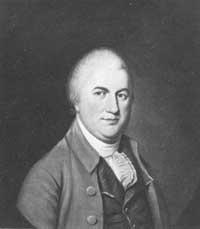 |
| Nathaniel Gorham |
|
|
| Nathaniel Gorham |

|
5th President of the United States in Congress Assembled |
In office
June 6, 1786 November 5, 1786 |
| Preceded by |
John Hancock |
| Succeeded by |
Arthur St. Clair |
2nd Acting President of the United States in Congress Assembled |
In office
May 15, 1786 June 5, 1786 |
| President |
John Hancock |
| Preceded by |
David Ramsay |
| Succeeded by |
Himself as 8th President of the United States in Congress Assembled |
|
| Born |
May 27, 1738(1738-05-27)
Charlestown, Massachusetts |
| Died |
June 11, 1796 (aged 58)
Charlestown, Massachusetts |
| Signature |
 |
Nathaniel Gorham (May 27, 1738 June 11, 1796, his first name is sometimes spelt Nathanial)([1]) was the fourteenth President of the United States in Congress assembled, under the Articles of Confederation. He served from June 1786 to November 13, 1786. He was preceded in office by John Hancock and succeeded by Arthur St. Clair.
Gorham was born in Charlestown, Massachusetts. He took part in public affairs at the beginning of the American Revolution, was a member of the Massachusetts General Court (Legislature) from 1771 until 1775, a delegate to the Provincial congress from 1774 until 1775, and a member of the Board of War from 1778 until its dissolution in 1781. In 1779 he served in the State constitutional convention. He was a delegate to the Continental Congress from 1782 until 1783, and also from 1785 until 1787. Gorham also served a term as judge of the Middlesex County, Massachusetts Court of Common Pleas.
For several months in 1787, Gorham served as one of the Massachusetts delegates to the United States Constitutional Convention. Gorham frequently served as Chairman of the Convention's Committee of the Whole, meaning that he (rather than the President of the Convention, George Washington) presided over convention sessions during the delegates' first deliberations on the structure of the new government in late May and June of 1787. After the convention, he worked hard to see that the Constitution was approved in his home state.
In connection with Oliver Phelps, he purchased from the state of Massachusetts in 1788 pre-emption rights to an immense tract of land in western New York State which straddled the Genesee River, all for the sum of $1,000,000 (the Phelps and Gorham Purchase). The land in question had been previously ceded to Massachusetts from the state of New York under the 1786 Treaty of Hartford. The pre-emption right gave them the first or preemptive right to obtain clear title to this land from the Indians. They soon extinguished the Indian title to the portion of the land east of the Genesee River, as well as a 185,000 acre (749 km²) tract west of the Genesee The Mill Yard Tract), surveyed all of it, laid out townships, and sold large parts to speculators and settlers. In 1790, after they defaulted in payment, they sold nearly all of their unsold lands east of the Genesee to Robert Morris, who eventually resold those lands to The Pulteney Association. Phelps and Gorham were unable to fulfill their contract in full to Massachusetts, so in 1790, they surrendered back to Massachusetts that portion of the lands which remained under the Indian title, namely, the land west of the Genesee. It also was eventually acquired by Robert Morris, who resold most of it to The Holland Land Company. Morris did keep 500,000 acres (2,000 km²) for himself, and that land became known as The Morris Reserve.
Gorham died in Charlestown, Massachusetts in 1796.
| United States Constitution |
|
|
Baldwin · Bassett · Bedford · Blair · Blount · Brearley · Broom · Butler · Carroll · Clymer · Dayton · Dickinson · Few · Fitzsimons · Franklin · Gilman · Gorham · Hamilton · Ingersoll · Jackson · Jenifer · Johnson · King · Langdon · Livingston · Madison · McHenry · Mifflin · G. Morris · R. Morris · Paterson · C. C. Pinckney · Pinckney · Read · Rutledge · Sherman · Spaight · Washington · Williamson · Wilson |
 |
|
| Presidents of the Continental Congress |
|
| First Continental Congress |
Peyton Randolph · Henry Middleton |
|
| Second Continental Congress |
Peyton Randolph · John Hancock · Henry Laurens · John Jay · Samuel Huntington |
|
| Confederation Congress |
Samuel Huntington · Thomas McKean · John Hanson · Elias Boudinot · Thomas Mifflin · Richard Henry Lee · John Hancock1 · David Ramsay · Nathaniel Gorham · Nathaniel Gorham · Arthur St. Clair · Cyrus Griffin |
|
| Italics indicate acting presidents 1 Did not serve |
|
| Political offices |
Preceded by
John Hancock |
President of the Continental Congress
June 6, 1786November 5, 1786 |
Succeeded by
Arthur St. Clair |
|
Arthur St. Clair
| Arthur St. Clair |
| March 23, 1737(1737-03-23) August 31, 1818 (aged 82) |


|
| Place of birth |
Thurso, Caithness, Scotland |
| Place of death |
Greensburg, Pennsylvania |
| Allegiance |
Great Britain
 United States United States |
| Service/branch |
 British Army (17571762) British Army (17571762)
 Continental Army (17751781) Continental Army (17751781)
 United States Army United States Army |
| Rank |
Major General |
| Battles/wars |
French and Indian War, American Revolutionary War, Northwest Indian War |
| Other work |
President of the Continental Congress
Governor of the Northwest Territory |
Arthur St. Clair (March 23, 1737 [O.S. 1736] August 31, 1818) was an American soldier and politician. Born in Scotland, he served in the British Army during the French and Indian War before settling in Pennsylvania, where he held local office. During the American Revolutionary War, he rose to the rank of major general in the Continental Army, but lost his command after a controversial retreat.
After the war, he was elected to the Confederation Congress, where he served a term as president and was appointed governor of the Northwest Territory. Disputes with Native Americans over land treaties resulted in the Northwest Indian War. In 1791, General St. Clair led an expedition against the natives that resulted in the worst defeat the United States Army would ever suffer at the hands of Native Americans. Although an investigation exonerated him, St. Clair resigned his army commission. He continued to serve as territorial governor until 1802, when he retired to Pennsylvania. Although once very wealthy, he died in poverty.
Early life and career
St. Clair was born in Thurso, Caithness, Scotland. Little is known of his early life. Early biographers estimated his year of birth as 1734, but subsequent historians uncovered a birth date of March 23, 1736, which in the modern calendar system means that he was born in 1737. His parents, unknown to early biographers, were probably William Sinclair, a merchant, and Elizabeth Balfour. He reportedly attended the University of Edinburgh before being apprenticed to the renowned physician William Hunter.
Seven Years War
Further information: Great Britain in the Seven Years War
In 1757, St. Clair purchased a commission in the British Army, Royal American Regiment, and came to America with Admiral Edward Boscawen's fleet for the French and Indian War. He served under General Jeffrey Amherst at the capture of Louisburg, Nova Scotia on July 26, 1758. On April 17, 1759, he received a lieutenant's commission and was assigned to the command of General James Wolfe, under whom he served at the Battle of the Plains of Abraham. St. Clair met young lady Phoebe Bayard, a member of one of the most prominent families in Boston and they married in 1760. Miss Bayard's mother's maiden name was Bowdoin and sister to James Bowdoin, colonial governor of Massachusetts.
Settler in America
On April 16, 1762, he resigned his commission, and, in 1764, he settled in Ligonier Valley, Pennsylvania, where he purchased land and erected mills. He was the largest landowner in Western Pennsylvania.
In 1770, St. Clair became a justice of the court, of quarter sessions and of common pleas, a member of the proprietary council, a justice, recorder, and clerk of the orphans' court, and prothonotary of Bedford and Westmoreland counties.
In 1774, the colony of Virginia took claim of the area around Pittsburgh, Pennsylvania, and some residents of Western Pennsylvania took up arms to eject them. St. Clair issued an order for the arrest of the officer leading the Virginia troops. Lord Dunmore's War eventually settled the boundary dispute.
Revolutionary War
By the mid-1770s, St. Clair considered himself more of an American than a British subject. In January 1776, he accepted a commission in the Continental Army as a colonel of the 3rd Pennsylvania Regiment. He first saw service in the later days of the Quebec invasion, where he saw action in the Battle of Trois-Riviθres. He was appointed a brigadier general in August 1776, and was sent by Gen. George Washington to help organize the New Jersey militia. He took part in Washington's crossing of the Delaware River on Christmas night 1776, before the Battle of Trenton. Many biographers credit St. Clair with the strategy which led to Washington's capture of Princeton, New Jersey in the following days. It was shortly after this that St. Clair was promoted to Major General.
In April 1777, St. Clair was sent to defend Fort Ticonderoga. His small garrison could not resist British Gen. John Burgoyne's larger force in the Saratoga Campaign. St. Clair was forced to retreat at the Battle of Ticonderoga on July 5, 1777. He withdrew his forces and played no further part in the campaign. In 1778 he was court-martialed for the loss of Ticonderoga. The court exonerated him and he returned to duty, although he was no longer given any battlefield commands. He still saw action, however, as an aide-de-camp to General Washington, who retained a high opinion of him. St. Clair was at Yorktown when Lord Cornwallis surrendered his army.
President of Congress
St. Clair was a member of the Pennsylvania Council of Censors in 1783, and was elected a delegate to the Confederation Congress, serving from November 2, 1785, until November 28, 1787. Chaos ruled the day in early 1787 with Shays' Rebellion in full force and the states refusing to settle land disputes or contribute to the now six year-old federal government. On February 2, 1787, the delegates finally gathered into a quorum and elected St. Clair as 9th President of the United States in Congress Assembled. St. Clair's tenure as President (February 2, 1787 October 29, 1787) was during an effective period, as Congress enacted both the Northwest Ordinance and the current United States Constitution.
Northwest Territory
Under the Northwest Ordinance of 1787, which created the Northwest Territory, General St. Clair was appointed governor of what is now Ohio, Indiana, Illinois, Michigan, along with parts of Wisconsin and Minnesota. He named Cincinnati, Ohio, after the Society of the Cincinnati, and it was there that he established his home. When the territory was divided in 1800, he served as governor of the Ohio Territory.
As Governor, he formulated Maxwell's Code (named after its printer, William Maxwell), the first written laws of the territory. He also sought to end Native American claims to Ohio land and clear the way for white settlement. In 1789, he succeeded in getting certain Indians to sign the Treaty of Fort Harmar, but many native leaders had not been invited to participate in the negotiations, or had refused to do so. Rather than settling the Indian's claims, the treaty provoked them to further resistance in what is sometimes known as the "Northwest Indian War" (or "Little Turtle's War"). Mutual hostilities led to a campaign by General Josiah Harmar, whose 1,500 militiamen were defeated by the Indians in October 1790.
In 1791, St. Clair succeeded Harmar as the senior general of the United States Army. He personally led a punitive expedition comprising of two Regular Army regiments and some militia. This force advanced to the location of Indian settlements on the Wabash River, but on November 4 they were routed in battle by a tribal confederation led by Miami Chief Little Turtle and Shawnee chief Blue Jacket. More than 600 soldiers and scores of women and children were killed in the battle, called St. Clair's Defeat, the "Columbia Massacre," or the "Battle of the Wabash." It was the greatest defeat of the American army by Native Americans in history with some 623 American soldiers killed in action as opposed to about 50 enemy dead. After this debacle, he resigned from the army at the request of President Washington, but continued to serve as Governor of the Northwest Territory.
A Federalist, St. Clair hoped to see two states made of the Ohio Territory in order to increase Federalist power in Congress. However, he was resented by Ohio Democratic-Republicans for what were perceived as his partisanship, high-handededness and arrogance in office. In 1802, his opposition to plans for Ohio statehood led President Thomas Jefferson to remove him from office as territorial governor. He thus played no part in the organizing of the state of Ohio in 1803. The first Ohio Constitution provided for a weak governor and a strong legislature, in part due to a reaction to St. Clair's method of governance.
Death and legacy
Arthur St. Clair, Patriot and a Founder of the United States of America, died in Greensburg, Pennsylvania on August 31, 1818 in his eighties and in poverty; his vast wealth dissipated by generous gifts and loans, and by business reverses, but, mainly by the refusal of Congress to reimburse him for monies that he had loaned during the Revolution and while governor of the Northwest Territory. He lived with his daughter Louisa St. Clair Robb and her family on the ridge between Ligonier and Greensburg. St. Clair's remains are buried under a Masonic monument in St. Clair Park in downtown Greensburg. His wife Phoebe died shortly after and is buried beside him.
A portion of The Hermitage, St. Clair's home in Youngstown, Pennsylvania was later moved to Ligonier, Pennsylvania, where it is now preserved, along with St. Clair artifacts and memorabilia at the Fort Ligonier Museum.
Places named in honor of Arthur St. Clair include:
In Pennsylvania:
- Upper St. Clair, Pennsylvania
- St. Clairsville, Pennsylvania
- St. Clair Township, Westmoreland County, Pennsylvania
- East St. Clair Township, Bedford County, Pennsylvania
- West St. Clair Township, Bedford County, Pennsylvania
- St Clair Neighborhood in Pittsburgh, Pennsylvania
In Ohio:
- St. Clair Township in Columbiana County, Ohio,
- St. Clairsville, Ohio
- Fort St. Clair park in Eaton, Ohio
Other States:
- St. Clair County, Illinois
- St. Clair County, Missouri
- St. Clair County, Alabama
References
- Notes
- Gregory Evans Dowd. "St. Clair, Arthur", American National Biography Online, February 2000.
- Smith, St. Clair Papers, 1:2.
- Books
- Smith, William Henry, ed. The St. Clair Papers: The Life and Public Services of Arthur St. Clair. 2 volumes. Cincinnati: Clarke & Co., 1882.
| Political offices |
Preceded by
Nathaniel Gorham |
President of the Continental Congress
February 2, 1787 November 4, 1787 |
Succeeded by
Cyrus Griffin |
| New office |
Governor of the Northwest Territory
July 15, 1788 November 22, 1802 |
Succeeded by
Charles Willing Byrd |
| Military offices |
Preceded by
Joseph Reed |
Adjutant Generals of the U. S. Army
January 22, 1777-February 20, 1777 (acting) |
Succeeded by
George Weedon (acting) |
Preceded by
Josiah Harmar |
Senior Officer of the United States Army
17911792 |
Succeeded by
Anthony Wayne |
| Presidents of the Continental Congress |
|
| First Continental Congress |
Peyton Randolph · Henry Middleton |
|
| Second Continental Congress |
Peyton Randolph · John Hancock · Henry Laurens · John Jay · Samuel Huntington |
|
| Confederation Congress |
Samuel Huntington · Thomas McKean · John Hanson · Elias Boudinot · Thomas Mifflin · Richard Henry Lee · John Hancock1 · David Ramsay · Nathaniel Gorham · Nathaniel Gorham · Arthur St. Clair · Cyrus Griffin |
|
|
|
|
Leaders of the United States Army |
|
Senior Officer /
Commanding General |
Washington · Knox · Doughty · Harmar · St. Clair · Wayne · Wilkinson · Washington · Hamilton · Wilkinson · Dearborn · Brown
Macomb · Scott · McClellan · Halleck · Grant · Sherman · Sheridan · Schofield · Miles |

 |
|
| Chiefs of Staff |
Young · Chaffee · Bates · Bell · Wood · Wotherspoon · Scott · Bliss · March · Pershing · Hines · Summerall · MacArthur · Craig · Marshall · Eisenhower · Bradley · Collins · Ridgway · Taylor · Lemnitzer · Decker · Wheeler · Johnson · Westmoreland · Palmer · Abrams · Weyand · Rogers · Meyer · Wickham · Vuono · Sullivan · Reimer · Shinseki · Schoomaker · Casey |
|
| Vice Chiefs of Staff |
Collins · Haislip · Hull · Bolte · Palmer · Lemnitzer · Decker · Eddleman · Hamlett · Abrams · Haines · Palmer · Haig · Weyand · Kerwin · Kroesen · Vessey · Wickham · Thurman · Brown · RisCassi · Sullivan · Reimer · Peay · Tilelli · Griffith · Crouch · Shinseki · Keane · Casey · Cody · Chiarelli
|
|
|
|
|
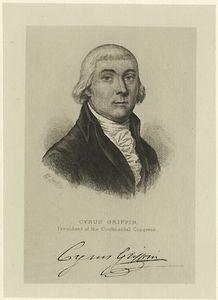 |
| Cyrus Griffin, president of the Continental Congress. |
|
|
|
Cyrus Griffin
| Cyrus Griffin |
|
President of the Continental Congress
|
In office
January 22, 1788 – November 2, 1788 |
| Preceded by |
Arthur St. Clair |
|---|
| Succeeded by |
Office abolished |
|---|
|
| Born |
July 16, 1749(1749-07-16)
Farnham, Virginia |
|---|
| Died |
December 14, 1810 (aged 61)
|
|---|
| Signature |
 |
|---|
Cyrus Griffin (July 16, 1749 – December 14, 1810) was a lawyer and judge who served as the last President of the Continental Congress, holding office from January 22, 1788, to November 2, 1788. He resigned after the ratification of the United States Constitution rendered the old Congress obsolete.
Griffin was born in Farnham, Virginia, in 1749. He was educated in England and in Scotland at the University of Edinburgh. While there Griffin married Christina Stewart, daughter of James Stewart, the sixth Earl of Traquair (1699-1779). This was done via a secret elopement and escape through the hills of Scotland after the Earl had forbade contact between Christina and Griffin after the suitor had announced his intentions. Estranged for many years, the Earl reconciled with his daughter via correspondence shortly before his death.
He was a member of the Virginia House of Delegates and a delegate to the Continental Congress from 1778 to 1781, and again from 1787 to 1788, serving as an appeals court judge in the interim. He served as President of Congress from January to November 1788, a mostly ceremonial position with no real authority. Some amateur historians later promoted Griffin and other Presidents of Congress as the original "Presidents of the United States", but the offices are unrelated.
Griffin was president of the Supreme Court of the Admiralty from its creation until its abolition, was commissioner to the Creek nation in 1789, and was judge of the United States District Court for the District of Virginia from December 1789, until his death (in Yorktown, Virginia) on December 14, 1810. He is buried next to his wife in the churchyard at Bruton Parish Church in Williamsburg, Virginia.
| Political offices |
|---|
Preceded by
Arthur St. Clair |
President of the Continental Congress
January 22, 1788 – April 30, 1789 |
Succeeded by
Office abolished |
| Presidents of the Continental Congress |
|---|
|
| First Continental Congress |
Peyton Randolph · Henry Middleton
|
|
| Second Continental Congress |
Peyton Randolph · John Hancock · Henry Laurens · John Jay · Samuel Huntington
|
|
| Confederation Congress |
Samuel Huntington · Thomas McKean · John Hanson · Elias Boudinot · Thomas Mifflin · Richard Henry Lee · John Hancock1 · David Ramsay · Nathaniel Gorham · Nathaniel Gorham · Arthur St. Clair · Cyrus Griffin
|
|
|
10th President of the United States
in Congress Assembled
January 22, 1788 to March 4, 1789
By Stanley L. Klos.
Cyrus Griffin was born in Farnham, Richmond County, Virginia in 1749 and died in Yorktown, Virginia on December 14th, 1810. He was educated in Britain, studying law at the University of Edinburgh and at the Temple in London. In Europe Griffin was admired for his fresh, untrammeled colonial spirit and his bright mind at the University of Edinburgh. It was at the University he became a close friend to Charles Stuart, Lord Linton, first son and heir of the Earl of Traquair. During the Christmas holiday, with Cyrus being so far from home, Charles invited him to his family's Traquair estate.
Cyrus Griffin was born in Farnham, Richmond County, Virginia in 1749 and died in Yorktown, Virginia on December 14th, 1810. He was educated in Britain, studying law at the University of Edinburgh and at the Temple in London. In Europe Griffin was admired for his fresh, untrammeled colonial spirit and his bright mind at the University of Edinburgh. It was at the University he became a close friend to Charles Stuart, Lord Linton, first son and heir of the Earl of Traquair. During the Christmas holiday, with Cyrus being so far from home, Charles invited him to his family's Traquair estate.
John Stuart, the Earl of Traquair had three daughters, the Lady Christina, the Lady Mary and the Lady Louisa. The Lady Christina was strikingly beautiful and her personality so magnetic that the handsome Cyrus Griffin couldn't resist making a bold, but private, declaration to win the Lady's heart. Cyrus, during the holidays, secretly courted the Lady Christina as any talk of a matrimonial alliance between the two young lovers would not be tolerated by the Earl. Christina also knew that if her brother, Lord Linton, discovered the couple's courtship plans the Griffin Stuart friendship would end abruptly and Cyrus would be asked to leave Traquair. Neither this, nor the fact that the Lady Christina had been properly reserved for a nobleman of fame and fortune dissuaded the young Virginian from falling in love.
The Earl of Traquair was a formal man, who was very attentive to the romantic and business customs of its ancestry. His family had a line of nobility stretching long before Columbus even discovered this new land everyone called America. He was determined to wed Lady Christina to man whose family would enhance Traquair's social standing in Great Britain. The idea of a colonial plebian, no matter how dignified his status was in Virginia, courting any of his daughters let alone the stunning Lady Christina was blasphemous in the European world of aristocracy.
These customs, obviously, didn't deter Cyrus as his ancestors had been aristocrats not only in Virginia but in Europe too! Maternally, he was part noble and part Huguenot as well. His grandfather was John Bertrand, the Huguenot who sought safety in Virginia. His grandmother Bertrand, Charlotte Jolie, was the daughter of a French Nobleman. Mary Bertrand married the Huguenot's son Leroy Griffin, of Rappahannock County. They were the parents of Cyrus and his sister Elizabeth, who married the wealthy Colonel Richard Adams, of Richmond Hill. This Hill was later named Church Hill, after Patrick Henry made his famous speech in Old St. John's culminating in immortal disjunctive enthymeme, "Give me liberty or give me death."
Cryus' belief in his nobility emboldened a declaration of his intentions to the Stuart Family after he won Christina's heart. Griffin believed that the Stuart Family would accept his noble lineage once they learned how deeply in love the Lady Christina was with a noble blooded Virginian. He couldn't be, however, more wrong as the Earl was furious upon receiving the news. He immediately admonished his son, Lord Linton, for allowing this Virginia plebian to enter Traquair's sacred gates. The Earl reportedly raved and ranted at the rest of his family, for not uncovering this mischief sooner as such a scandal threatened the social standing of his noble house. Cyrus straight away escorted off the estate and never invited to Traquair again. The Earl forbade Christina from ever seeing Cyrus again and did everything in his power to end the love affair.
The courtship did not end and became real runaway months later through the forests, over hill and dale in a wild flight from Traquair on a spring day in 1770. In the escape, the Lady Christina fell and broke her ankle. Family legend has it that Cyrus, underdetermined to let the event spoil their passionate plans, scooped her up and carried his lover through the countryside not to a doctor but to a parson. The minister, despite their disheveled appearance and her swollen ankle, united them in the bonds of British matrimony on April 29th.
This act estranged the young lady forever from Earl and Christina Anstruther Weir Stuart, her mother. Despite this, the Griffin marriage blossomed and one year later Lady Christina bore her first child, John on April 20, 1771. Due to Lady Christina's estrangement from their family and Griffin's meager allowance the young couple struggled during Cyrus's ongoing legal education in London. News of the courtship and marriage of the Griffins finally reached America through the business contacts of Colonel Richard Adams. Griffin's brother-in-law, upon learning of the noble yet struggling marriage, wrote this letter to his London merchant:
Mr. Cyrus Griffin, who has been several years at Edinburgh studying the law, and we expect at this time is at the Temple, has lately been privately married to the oldest daughter of the Earl of Traquair; and we suppose his lordship may have some struggles to reconcile himself to such a connection with a plebian, we are apprehensive that Mr. Griffin, from this unexpected event, this extraordinary call, may have occasion for more money than he can readily command, especially as he has been so unfortunate as to have some bills remitted him, return protested. I shall, therefore, esteem it a great favor if you will present him the enclosed and give him any assistance in this way in your power. You will find him a solid, sensible young man well worthy of your notice and friendship.
In 1774, Cyrus Griffin and Lady Christina bore a second child, Mary. Historians are not sure how long the couple remained in London. The author does know, thanks to the acquisition of a 1776 London Complaint by a fellow Virginian, Burgess Ball, that their London financial difficulties continued into the year of Independence. According to this legal document, Cyrus Griffin defaulted on his January 6th, 1776 "First Bill of Exchange for one hundred pounds sterling/ for one Hundred and thirty pounds current money here received
" in London, England. The complaint was filed by wealthy Virginian Burgess Ball's agents on June 14, 1776 after the collector went to
|
Number 3 Fig Tree Court in the Temple where Cyrus Griffin, Esq. on whom the same is Drawn lodges to which he had removed from Grange Court Cary Street where having knocked several times at the Door and no person appearing to give an answer I exhibited the said Bill to a man belonging to the Chambers a Story Lower and demanded from him if he could inform me where the said Cyrus Griffin was or where I might procure payment of said Bill
|
June 14th, 1776 default on a Bill of Exchange legal document in favor of Burgess Ball on Cyrus Griffin, Esq. of 3 Fig Tree Court at the Temple in London. Courtesy of the Klos Family
The default on the Bill of Exchange was eventually paid by Cyrus Griffin and this sprouted a friendship between Burgess Ball and the go getting Virginian. Griffin returned to Virginia and as a young lawyer was a staunch supporter of the patriot cause. In 1777, 1778, 1786, and 1787 Griffin was elected a member of the State House of Delegates. He was also a member of the Virginia legislature.
Cyrus Griffin was elected a delegate to the Continental Congress in 1778 and served until 1780. During the end of his first term as a Delegate, Griffin wrote Governor Thomas Jefferson this taxing letter on October 6, 1778:
You will be good enough, my dear Sir, to excuse this Letter. There are but few Men indeed with whom I could wish to be thus candid. It appears to me that Congress will shortly be dissolved. If the large Emissions of Money and visionary Expeditions do not bring forth our destruction, I greatly fear that Party will complete the matter. Congress exhibit not more than two or three Members actuated by Patriotism. Great questions are carried every day in favor of the Eastward, and to the prejudice of the Southern States. Great questions are now upon the Carpet and if determined in the affirmative will do excessive Damage to Virginia and Maryland particularly. At present we are under secrecyperhaps in a little time I shall think myself obligated to quit Congress; I will not sit in a house whose proceedings I cannot assent to with honor, nor is it in my abilities to oppose them with success. I value most what our great Politicians value least.
Congress is at present a Government of Men. It would astonish you to think how all affairs proceed upon the interested Principle: Members prostituting their votes in expectation of mutual assistance upon favorite Points. I am apprehensive that in getting free from oppression in one quarter, we are likely to establish it in another; by avoiding one set of Plunderers we are certain to fall into the Clutches of a still more dangerous set. I am sorry our good Friend Harvey is about to leave Congress; he is a valuable man in times like the present, a man of great virtue and boldness of Spirit. If the Land office should be established, put him at the head of it; his abilities and honesty will be highly necessary in that Employment.
The motions of the Enemy are very uncertain; there is an expedition going forward on the part of General Clinton, but to what object is merely conjecture, perhaps to Boston New England and the French Fleet are powerful inducements. All Circumstances considered, I believe they are going to guard the remaining parts of their Dominion. In the mean time they will destroy everything they possibly can, and I should not wonder if Philadelphia itself was reduced to ashes before their departure. As yet Spain has taken no part to our advantage, indeed Arthur Lee still remains at Paris. The Court of Berlin have refused William Lee the Commissioner of Congress to that quarter: he is now gone to Vienna, the most accomplished Metropolis in the world. We are plagued to death with quarrels and recriminations relative to our Commissioners abroad; these men will involve the Continent in perdition. It is
absolutely necessary that Dean should be sent over to Europe for the most valuable purpose in the world, but some Gentlemen are determined to ruin an innocent Character, notwithstanding he alone has the great merit of concluding that valuable Treaty with the Minister of France. Tell MacLurg and President Madison they are both s____ in not answering my Letters. The next I write you will be in a different stile; this only by way of preface. I must beg to trouble you with my best respects to Mr. Wythe.
The government "dissolved" two weeks later but Griffin returned to Congress, in December, to begin another term despite his bleak assessment of the 1778 governing body. In July of 1779 Delegate Griffin wrote Governor Thomas Jefferson a pointed letter giving us more insights into the future President's thoughts on war and the price of Independence:
It appears to me that Virginia will do her part in placing things upon an adequate foundation; a large Income of Money, and a most judicious taxation. Members of Congress highly applaud your wisdom in demanding Indian Corn, Wheat, Tobacco etc. I wish to heaven such measures had been adopted many months ago by every State in the union. I have no doubt the Enemy are waiting thus long to see the downfall of our paper Credit, but even that calamitous affair would do them no essential Service; America can never be reunited to Britain; and finances with our brave and determined people are only a secondary consideration. The proceedings of Council relative to G. Hamilton etc
were received by Congress with the utmost applause; the whole matter is beautifully stated; the sentence judicious and spirited. That peace is a most desirable object no man in his senses ought to deny, but then it must be a peace honorable to America and grateful to our allies. I hope such a one will take place before Christmas next. By the violence of a giddy Multitude it would be highly disagreeable to patch up even an Independent peace at the expense of public faith and future salvation.
Why are committees upon the establishment throughout all America? They have almost murdered the French Agent at Wilmington. Indeed Fisheries are too much of external nature to be fought for at present; yet in a treaty of peace I would not relinquish them; they should stand upon the common right of Independent nations. But unhappily this will not answer the purpose. The bleeding Continent must bleed still further. When I say my expectations lead to peace I do not mean that England will expressly acknowledge our Independence; the pride of George will not submit; but she may treat with us as an Independent people notwithstanding provided our demands are not unreasonable, which the French Court are in apprehension about, and therefore trust that moderation and a wellguaranteed peace ought not to be despised in our low circumstances. The Enemy with a body of five thousand men have plundered and destroyed Newhaven NB in Connecticut; they carried off the wife and children of old Shearman the member of Congress; yesterday he left this City full of anxiety and trouble; I pity the Lady and Children exceedingly, but I have no tender feelings for the old fellow on many accounts.
In September of 1779 Cyrus Griffin discharged financial matters concerning his late father-in-law, John Stuart, through Benjamin Franklin. In the end Stuart, through his will, remembered his daughter in America after many years of estrangement. Griffin also took the time to inform Minister Franklin of his thoughts on Congress recalling the foreign ministers and explain why Mon. Gιrard, "a most valuable and most amiable Man indeed" was not provided with a more fanciful welcome in Philadelphia:
"I do myself the honor to enclose a packet of letters which being carried by your Servant to the place directed will greatly oblige me. We thank you for the trouble of attaching a Bond executed by the late Earl of Traquair. This Letter will be conveyed by Mon. Gιrard, a most valuable and most amiable Man indeed! And who has given all the satisfaction possible in his public and private Character. No doubt you were astonished how any part of Congress should wish that all the Commissioners might be recalled to Philadelphia. It was for the purpose of explaining those unhappy dissentions and animosities which have arisen among them; and tho Yourself would have left Europe at a most critical period, yet returning to France with accumulated honors after receiving the blessings of America and convincing Congress in what path to walk upon this unhappy and most disgraceful business, perhaps the whole matter impartially considered the united States would have found great benefit if such a plan had taken place.
The French are a gay people and entertain a good deal; I am afraid Mon. Gιrard has thought the Delegates in Congress were rather deficient in that respect; but really the expense of every article is so very enormous, and the allowance from the different states so very trifling, that a person of a handsome American fortune could not entertain frequently without absolute ruin in the period of two or three yearsand especially since some of the states think it best for their delegates to live in separate houses. In the course of conversation you would do some of us a singular favor to hint this matter to Mon. Gιrard since it has the appearance of not paying proper Civilities to a man of his worth and elevated station.
On September 21st Griffin took the time to reply to Burgess Ball, who first served in cause for Independence as a captain with the 5th Regiment of Virginia and later as lieutenant colonel of the 1st Virginia Regiment Infantry of the Continental Army. In 1776, Burgess Ball organized, equipped and clothed an infantry regiment for the Continental Line (which probably why he sought payment so earnestly on Griffin's Bill of Exchange in 1776). Griffin writes his friend and his former Bill of Exchange creditor in 1779:
"I have recd. your letter dated on the 4th. No person upon Earth can be more welcome to what little satisfaction I am able to give him in the way of writing now and then. The subscription to Dunlap's paper I think is 80 dollars by the year, I shall not order that matter until you again write me for the purpose. I fancy the Enemy will attempt nothing great notwithstanding the arrival of Arbuthnot. I wish we could know with Certainty to what place the Regiments lately embarked from N. York are intended; perhaps the Count D. Estaing may fall in with them, the Count having quitted his former station. I am almost as sanguine as yourself that the presentCampaign will finish the Contest; the opposition to Great Britain is very formidable indeed; and yet when so conspicuous a nation begins to fall, perhaps she may go on to the brink of destruction, and of consequence the war may be lengthened a considerable time to come.
The resolutions of Congress relative to the Army were but so many Acts of Justice; and I hope the different states will provide half pay exactly conformable to the English establishment. Congress have done and are doing all they can to appreciate the money; yet the states and Individuals can alone apply the most effectual remedy by loaning and taxation. Enclosed you will find a handsome address upon this subject; written by our president; it contains to my Judgment a great deal of sterling sense and the most solid reasoning. I do not absolutely condemn your associations: but perhaps in consequence of them you may want many comfortable private supplies. I shall take notice of what you mention about the adjutants, paymasters, and Clothiers, I thank you exceedingly and General M[uhlenberg] for a sight of those papers enclosed to his Brother [Frederick Muhlenberg]. They greatly expanded my Ideas upon the subject; our officers write and fight in the same spirit. Your circumstantial account of that affair has given me pleasure tho I feel exceedingly for your situationand yet w[hen] the public are acquainted with the whole matter as more praise will be given you as the brave and fortunate officer who executed the command. I would take a trip to Camp with the utmost satisfaction; but Smith and Fleming are setting off to Virginia, and there only remains a bare delegation."
Later that month Governor Jefferson wrote President Samuel Huntington requesting Naval Commissions in the form of "blank letters of marque for use in this state" and copied the Virginia Delegation on the matter. Such papers were required for International and Intrastate trade. They were executed by the President and Secretary of the Continental Congress. The burden of issuing these papers to merchant U.S. was lessened by the President signing blank commissions and giving them to the Governors of each state to issue as they deemed necessary. On November 2nd, 1779 Griffin was quick to inform Jefferson that
"My Colleague Mr. Mercer has charged himself with the naval Commissions mentioned a post ago in a letter from your Excellency. We have a report from the Eastward that a bloody Engagement has happened in English Channel, and that the admiral of his Britannic Majesty was sunk with sails and Colors flying; but we do not give the utmost credit to the Intelligence."
On November 9th, 1779, Griffin wrote a lengthy letter to the Virginia House of Delegates as their lone representative to the Continental Congress questioning the federal political authority over land and other issues involving Virginia and the Continental Congress:
I beg you will do me the honor to lay this letter before the house. I am at present alone in this important delegation; perhaps abundantly more important than my Constituents suppose. A majority of states in Congress shew a manifest inclination to lessen the weight of Virginia in the general scale of the union; and the Continental
Credit is already upon the very brink of ruin. At such a period the assembly are satisfied that my abilities and Influence are greatly inadequate to represent so vast a Country as Virginia, even upon the supposition I had the power of voting in Congress. I feel exceedingly for the rights of my Country, and the Welfare of America, and I hope to be excused when I express some degree of astonishment that at least three members are not sent forward to Philadelphia, and members too of the first abilities and character.
After a great deal of heat and debate Congress have thought proper to pass a resolution relative to the Land office, which resolution and other proceedings were transmitted by the last post. I am sorry to observe that so important a measure as that should have taken its origin from the Memorial of two private Companies claiming a large extent of Lands within the Bounds of Virginia to their own use and benefit, and offering a recompense to Congress of ten thousand pounds sterling for a confirmation thereof; and however as a member of the Virginia assembly I might be induced to make some compensation to the Indiana Claimants which they are very desirous to accept, and wish to acknowledge the Jurisdiction of Virginia and to defend the state against all opposition whatever, yet I think Congress have no business to interfere with such matters at the expense of our chartered rights, and the rights of an independent Legislature. When Virginia instructed her delegates in Congress to sign the declaration of Independency what did she mean by reserving the sovereignty and internal Government of the state? No deception could be intended of any latent claim to extended Boundary; for Virginia ceded to Pennsylvania and Maryland and the two Carolinas all the Countries within their respective charters which might be supposed a part of her chartered territory and then adds 'the western and northern extent of Virginia shall in all respects stand as fixed by the Charter of King James the first in the year 1709 [1609], and the public Treaty of Peace between Great Britain and France in 1763.'
Yesterday a letter was read in Congress from Colonel Brodhead with a late date at Pittsburg giving Information that some Inhabitants from the Counties of Yoghagania and Ohio had committed Trespasses upon the Lands of the Indians on the farther side of the Ohio River, which produced the enclosed Resolution."
Delegate Griffin would continue serving in the Continental Congress through the harsh winter of 177980 and the British Capture of Charleston where, former Continental Congress President Henry Middleton capitulated and swore allegiance to King George III. Griffin stayed true to the patriot cause. His astute, London trained legal mind was an invaluable asset to Congress during these troubling times. Congress wisely, after finally forming a Court of Appeals, presented Griffin with an appointment as a Judge. President Samuel Huntington wrote to Cyrus Griffin on May 1, 1780:
'"I have the Pleasure and Satisfaction of presenting you with the enclosed Act of Congress & Commission by which you are appointed and constituted one of the Judges of the Court of Appeals."
Cyrus Griffin wrote to Samuel Huntington on May 4th:
"The appointment of Congress to the Court of appeals does me great honor. I thank them exceedingly for the confidence they repose in my Integrity and abilities, but as the nomination was unsolicited and even unknown to me, and being delegated by the state of Virginia to a very different employment I do not think myself justifiable in a peremtory acceptation of the office without the approbation of my constituents. In the mean time, the state of Virginia being so ably and fully represented without my attendance, if Congress shall think proper I will undertake the business of a Judge and endeavor to pay that attention which so important and distinguished a commission may require.
I thank you, Sir, for the very polite manner in which the act of Congress has been communicated to me, and as I always profess the utmost affection for the dignified and extensive body over which you preside so believe me to be with the highest personal esteem"
One month later on June 9th, 1780 Cyrus, still a delegate, wrote Governor Jefferson a most alarming letter:
"I have the mortification to inform you that the Enemy are parading the Jerseys in great force, at least with six thousand Infantry and the General says with a large body of horse also. In consequence of this movement the Commander in chief requests that major Lee may be ordered to the main army, and I suppose this morning Congress will prevent his proceeding to the southward. A Committee of Congress who have been many weeks at head quarters with very extensive powers, in concurrence with G. Washington and the marquis de La Fayette, think proper to call upon the different states for a considerable quantity of specific supplies in addition to a former resolution of Congress, and also for 22,000 militia immediately to join the northern armybut whether Congress will send forth the requisitions to the state of Virginia I cannot determine as the neighboring states will demand your utmost exertions.
I suppose the great plan of finance is already happily executed; indeed the resolutions of Congress should be complied with, as a General schemefor without unanimity upon these important points our confederation will break to pieces. What ever may have been the opinions of some states in Congress, a large majority of that body ought to be regarded especially in critical times like the present.
Congress have no objection that I should sit in the Court of appeals, notwithstanding my resignation be not accepted but my attendance must be dispensed with whilst acting in that commission. It is probable I shall not act in that Commission long. There has been skirmishing in the Jerseys. The militia behaved well, as yet no great mischief. The army is moving towards the enemy."
Griffin's last letter to Governor, On June 13th discussed his appointment and additional enemy military maneuvers:
"As this will be the last letter I shall have the honor of writing your Excellency in my official capacity, I hope to obtain the governor's approbation that whilst alone and at the head of the Delegation to Congress I have done my part in making those representations and giving that Intelligence from time to time, which the executive ought constantly to be informed of. I do not recollect any one matter of importance that was omitted in my communications to your Excellency and I confess as an Individual that I felt a pride and pleasure in corresponding with a great character, exclusive of that sacred duty which my honorable appointment demanded of me.
The Enemy are still in the Jersey, not far from Elisabeth Town and by a letter from Lord Sterling they are considerably reinforced. They have built a floating bridge to secure a retreat to Staten Island if necessary. Two or three little battles have taken place, in which the militia fought well but have suffered greatly. I fancy the object of the Enemy was to try the force of General Washington's regular Troops. Unluckily by the experiment they find our illustrious commander unable to meet them without the aid of militia and what next? I fear they will remain in the Jersey until Clinton gets back from Charles Town, and then make a bold attempt upon the continental stores and army. I wish the French fleet and Troops were happily arrived. About fifty sail of merchantmen have got to this City within a few days past. By one of them the last night we are told that Barbadoes is taken, and probably by this time Antigua and Saint Kitts, but I cannot credit so hastily as some Gentlemen are disposed to do."
Cyrus Griffin would serve as a Judge on the Court of Appeals until 1786. It was in the previous year that the financially insolvent Confederation government notified the judges that they could no longer pay their salaries. Despite this Congress expected the men to continue with their commissions, like them, without any pay. Griffin served in that payless position for several months before writing a letter to the appropriate committee on January 24, 1786. Griffin's letter contained a protest against Congress' July 1, 1785, decision to discontinue the salaries of the judges of the court of appeals without vacating their commissions. The Secretary of the United States, Charles Thomson responded on February 13, 1786 as follows:
"Your letter of the 6 of January was duly received and communicated to Congress, in consequence of which they passed a resolution a copy of which I have the honor to enclose."
The resolve reasserted that it was "necessary that the salaries of the said judges should cease," but in an appeasing gesture Congress also avowed "That Congress are fully impressed with a sense of the ability, fidelity and attention of the judges of the court of Appeals."
Cyrus Griffin resigned the commission and returned to Virginia and was quickly elected a delegate to the state assembly in 1786 and served until late 1787. By the end of his term it was clear that Virginia needed experienced representation in the United States in Congress Assembled as the new Constitution had emerged and much work needed to be done to insure its ratification and subsequent implementation.
Griffin was elected in October of 1787 by Virginia to serve as their Delegate in what would be come the last session of the United States in Congress Assembled. He arrived in New York in November and as in the past no quorum could be formed in either that month or December to conduct the nation's business. On December 15th he wrote his friend and Constitution Signer Thomas Fitzsimmons on a matter concerning the Treasury Board:
I should have written some days ago, but waited a private conveyance which at last has disappointed me. I had great difficulty in getting your little matter adjusted with the Treasury Board, because the promise of payment was to Harison only, and because not a shilling was in hand for continental purposes; however, as being preferable to nothing, You will receive enclosed a warrant upon Thomas Smith for the sum entrusted to my care. I was obliged to accommodate a little affair of my own in the like mode which has occasioned an unexpected inconveniency. For some days past I have been confined with a violent cold and disagreeable affection of the head; but as nothing very alarming is to be feared I wish my poor little woman to know but little of it. I doubt the family of Mr. Marshall's will give you and your amiable lady a good deal of Trouble; but as they are the last few months they will ever spend to the northward I hope it may be forgiven; for indeed having but little property of my own and scarcely any thing by my wife, I should not be justifiable in spending that little at a distance from my own country even for the purposes of Religion; yet in the meantime I flatter myself they will ask for any thing that may be wanting, and when the little stock is expended that you were kind enough to take charge of I will endeavor to procure them more.
I make free to enclose a letter for your friendly messenger to deliver. There are but four states rep[r]esented in Congress and I see no probability of a majority for weeks to come. Our foreign correspondence contain the strongest reasons why a fixed and efficient government should be organized with all expedition."
In early January 1788, the United States in Congress Assembled still was not able to muster a quorum. On January 13th, The New York Daily Advertiser contained a notice that the Connecticut convention had ratified the Constitution by a vote of 127 to 40. The newspaper also included a copy of John Lansing's and Robert Yates' December 21 letter to Gov. George Clinton explaining their objections to the Constitution. Griffin wrote Fitzsimmons of this news on the same day:
We are also very impatient for European Intelligence; nothing of consequence can
as yet be relied upon; the packets are hourly expected. A little period since our Ministers abroad were predicting a speedy war. I do not believe the affairs of Europe exhibit at this time a more pacific appearance. If the contest in Holland has terminated with peace to the provinces, France will accept the challenge from England with spirit and with equal ability. A little while and then we may determine with certainty.
Connecticut has received the Constitution; a great majority. Four states have now adopted. Parties are running very high in Massachusetts: Samuel Adams and his friends have at length come forward: the Delegates from that Government, who understand characters, are doubtful of a happy Issue. If Mass. should be so unwise and dishonest to reject the system, N. York and Virginia will not hesitate one moment to follow the example; and then farewell to a federal Government of the whole; the baneful, the fatal consequences not one of us can foresee in their extent.
I beg leave to trouble you with a small letter to Spruce Street. I intended to Philadelphia for a little; but as my cold is bad, and what is still worse my pay would cease when absent from the Seat of Congress. I believe dear Madam had better spend the long nights without a partner, than the short days without Soup.
Do me the kindness to present my best Regards to your lady.
|
On January 22, 1788 with the arrival of Jonathan Dayton from New Jersey the last United States in Congress Assembled government finally reached a quorum. Their first order of business was to choose the last President of the Unites States Confederation. The Delegates, wisely, sent an important message to the States still deliberating ratification of the newly proposed Constitution of 1787. They overwhelmingly selected a member who heartedly supported the ratification of the new Constitution, Cyrus Griffin. The Massachusetts Delegation wrote their Governor, John Hancock the following day:
|
Since we last did ourselves the honor to address Your Excellency nothing of importance has taken place until yesterday when the delegates from seven States being assembled, Congress proceeded to the choice of The Honble. Cyrus Griffin Esq. for their President. The States of Georgia, N Carolina, Connecticut & N Hampshire have each a member present, but are unrepresented.
New York will probably make their election this week, And R Island is without a Member in Congress. The arrival of a Minister, Count de Moustiers from the Court of France, is a fresh proof of the attention, which the United States have uniformly received, from an illustrious ally; And we are confident of Your Excellency's concurrence in the sincerest wishes, that whilst our Nation is respectable abroad, Nothing may take place that will diminish our importance at home.
We shall continue to detail to Your Excelly from time to time, such facts as may be that of consequence to be communicated.
Secretary Thomson's letter to the States on the 23rd read:
I have the honor to inform your Excellency that on Monday last Seven states assembled, namely Massachusetts, New Jersey, Pennsylvania, Delaware, Maryland, Virginia, and South Carolina, and from New Hampshire Mr. Gilman, from Connecticut, Mr. Wadsworth, from North Carolina, Mr. White and from Georgia Mr. Baldwin. Yesterday Congress proceeded to the election of a President and made choice of His Excellency Cyrus Griffin
|
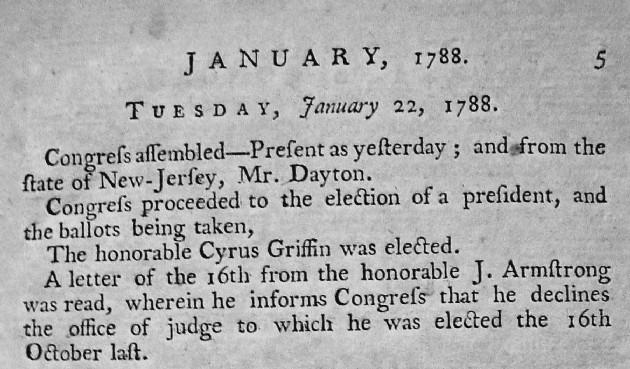 |
| The Election of Cyrus Griffin JOURNALS OF THE UNITED STATES IN CONGRESS ASSEMBLED containing the proceedings from the 5th day of November, 1787 to the 3rd day of November 1788, Volume XIII, Published by order of the United States in Congress Assembled, [Philadelphia] Printed by John Dunlap, 1788. – Courtesy of the Author |
|
|
From January 23rd to the 31st congress failed, once again, to achieve a quorum. On February 1st the new members were faced with reviewing a backlog of reports and letters. Congress failed to achieve a quorum on the 6th and didn't reconvene until the 12th when they authorized, John Jay, the Secretary for Foreign Affairs to issue sea letters. Congress met again on the 14th and agreed on a date to receive the new French Minister, Comete de Moustier. Sometime in February his family established residence in the home of Thomas Fitzsimmons. On the 18th of February Griffin wrote Fitzsimmons:
I ought to beg pardon for having so long neglected your very obliging letter. The congratulations of a worthy man and so friendly a mind must always be acceptable to a heart of sensibility. I thank you for them; and yet I feel no addition of real satisfaction in being thus elevated, but truly and with sincerity I experience the reverse.
My family are the great object I have in contemplation, and if this promotion in its consequences shall redound to the advantage of my children my utmost wishes will be accomplished, so far as private considerations are permitted to operate; at all times and upon all occasions I would sacrifice my ease to their emolument. And as to the public, it is not in my power to do any essential services, but I will discharge my duty with honesty and to the best of my abilities.
The consultation between the ladies has certainly been a wise one; how happy is lady
C. [His wife Lady Christina] in having so amiable and intelligent a friend! And yet I am almost tired to death with this kind of life, in a croud thro' the day and solitary at night; the family must certainly be set in motion in April or May unless something material should intervene to prevent a Journey to N. York; and if then yourself and Mrs. FitzSimons can make it convenient to spend some time with us how extremely rejoiced I should be; in point of health the excursion might be of service to your kind lady, and would add greatly to the pleasure of those who admire and love her.
The proposed constitution now stands upon a firm basis; the ratification of Massachusetts will carry it triumphantly throughout. N. Ham. will presently adopt it. Maryland and South Carolina by large majorities in convenient time; N. York, Virginia, and N. Carolina must find their concurrence indispensably necessary; and even Rhode Island in all probability will soon be deliberating. Colonel R. H. Lee and Mr. John Page, men of Influence in Virginia, are relinquishing their opposition; but what to us is very extraordinary and unexpected, we are told that Mr. George Mason has declared himself so great an enemy to the constitution that he will heartily join Mr. Henry and others in promoting a southern Confederacy; Alas! how inconstant is the mind of man. All the European Information of a public nature has been communicated in the newspapers.
On February the 28th Griffin's Congress received the treasury report on the foreign debt and on the 29th they elected paid Chaplains of the United States in Congress Assembled:
That two chaplains be appointed for Congress whose salaries shall not exceed three hundred dollars each per Annum to commence from the day of their appointment, so it was resolved in the affirmative. Congress proceeded to the election and the ballots being taken Doctor Provost and Doctor Rogers were elected.
|
GRIFFIN, Cyrus, jurist, born in Farnham, Richmond County, Virginia in 1749; died in Yorktown, Virginia, 14 December 1810. He was educated in England studying law at the University of Edinburgh and at the Temple in London. While in England Griffin courted nobility and married a Lady Christhena, daughter of John Stuart, sixth Earl of Traquair. He returned to Virginia and as a young lawyer gave early adhesion to the patriot cause. Griffin was elected a member of the State house of delegates in 1777, 1778, 1786, and 1787. , was a member of the Virginia legislature.
Cyrus Griffin was elected a delegate to the Continental Congress in 1778 and served until 1761. He was elected as a delegate to the United States in Congress Assembled in 1787. On January 22, 1788 Griffin was elected President of the United States in Congress Assembled serving until the government's demise in 1789. The Chronology of his presidency is as follows:
January 21 Convenes seven states represented. January 22 Elects Cyrus Griffin president. January 23-31 Fails to achieve quorum
February 1 Reviews backlog of reports and letters. February 5 Receives report on Massachusetts-New York boundary survey. February 6-9 Fails to achieve quorum. February 12 Authorizes secretary for foreign affairs to issue sea letters. February 14 Sets date for reception of new French minister, comte de Moustier. February 19 Elects John Cleves Symmes judge of the Northwest territory. February 25 Debates appointment job superintendent of Indian affairs for the southern department. February 26 Holds audience for comte de Moustier. February 28 Receives treasury report on foreign debt. February 29 Appoints Samuel Provost and John Rodgers chaplains of Congress, and Richard Winn superintendent of Indian affairs for the southern department; debates Kentucky statehood motion.
March 4 Debates Kentucky statehood in committee of the whole. March 6 Receives reports on the claims of French settlers in the Illinois country and on the survey of western lands. March 10-11 Fails to achieve quorum. March 12 Receives report on military bounty lands. March 18 Receives communications on Indian affairs. March 19 Debates western land ordinance amendment. March 24-27 Debates western land ordinance amendment. March 31 Fails to achieve quorum.
April 1-30 Fails to achieve quorum.
May 1 Fails to achieve quorum. May 2 Receives treasury report on proposed new Dutch loan, three war office reports on Indian affairs, and ten communications from the secretary for foreign affairs. May 5 Receives reports on western land issues. May 8 Elects Jonathan Burrall and Benjamin Walker commissioners for settling the accounts of the five wartime departments. May 20 Authorizes fortnightly posts between Philadelphia and Pittsburgh. May 21 Receives treasury report on coinage. May 22 Orders institution of suits to collect outstanding Continental accounts. May 26 Receives treasury report on western land contracts and war department report on settler violations of Cherokee treaty rights. May 27-29 Debates western land ordinance amendment.
May 30 Debates Kentucky statehood in committee of the whole.
June 2 Receives committee of the whole report recommending Kentucky statehood. June 3 Elects grand committee on Kentucky statehood. June 5 Fails to achieve quorum. June 6 Authorizes survey of New York; Pennsylvania boundary preparatory to granting Pennsylvania greater access to Lake Erie. June 9 Directs treasury to submit 1788--;89 fiscal estimates. June 12 Receives report on land reserve for French settlers in the Illinois country. June 13 Responds to French protest against Virginia's harboring a French pirate. June 17 Receives war office report on manpower and recruitment. June 18 Receives report opposing state inspection of the mails. June 19 Debates western land ordinance amendment. June 20 Elects Joseph Martin Continental agent to the Cherokees; authorizes negotiation of western land contract with George Morgan associates. June 24 Authorizes three-month extension of Continental claims. June 25 Abolishes office of inspector of Continental troops. June 27 Debates report on Georgia--;Creek Indian affairs.
July 2 Debates western land ordinance amendment; receives notification of the ratification of the Constitution by the ninth state (New Hampshire); appoints committee "for putting the said constitution into operation." July 3 Postpones action on Kentucky statehood until proceedings shall commence under the new Constitution. July 7-8 Debates western land ordinance amendment. July 9 Refers fiscal estimates to committee; adopts "supplement" to western land ordinance. July 14 Debates report on implementing the Constitution. July 15 Rejects terms of Georgia's western land cession, but accepts responsibility for southwestern frontier defense. July 17 Directs resumption of western land surveys; rejects proposed Virginia western land reserve for military bounties. July 21 Receives report on Continental Army manpower needs. July 25 Orders deployment of Continental troops to pacify Luzerne County, Pa. July 28 Debates report on implementing the Constitution; rejects motion to establish capital at Philadelphia. July 30 Rejects motion to establish capital at New York.
August 1 Extends term of northern superintendent of Indian affairs. August 4 Extends term of southern superintendent of Indian affairs. August 5-6 Debates motions on the location of the capital. August 7 Debates status of delegates from states that have not ratified the Constitution. August 12 Plans mobilization of frontier militia against western Indians. August 13 Debates report on implementing the Constitution. August 20 Adopts 1788 requisition. August 26 Debates report on implementing the Constitution; seeks Spanish cooperation for apprehending fugitive slaves fleeing to Florida. August 28 Revises George Morgan associates western land contract. August 29 Confirms land titles of French settlers in the Illinois country.
September 1 Condemns settler encroachments on Cherokee lands. September 2 Debates report on implementing the Constitution. September 3 Reserves Ohio lands of Christian Delaware Indians; rejects motion to establish capital at Annapolis. September 4 Debates report on implementing the Constitution; confirms land contract giving Pennsylvania large tract bordering Lake Erie. September 8 Receives John Jay report on negotiations with Spain concerning the Mississippi question. September 13 Adopts plan for implementing the Constitution. September 16 Recommends that states ban importation of felons; directs suspension of negotiations concerning the Mississippi question. September 18-24 Fails to achieve quorum. September 26-29 Fails to achieve quorum. September 30 Receives report on treasury department inquiry. October 1 Rejects Silas Deane settlement of Beaumarchais' accounts.
October 2 Receives report on war department inquiry. October 6-7 Fails to achieve quorum. October 8 Receives communications on Indian relations in the western territory. October 10 Suspends the work of the commissioners appointed to settle the states' Continental accounts; adjourns what proves to be its final session under the Articles of Confederation. October 13-16 Fails to achieve quorum. October 21
November 1 Fails to achieve quorum. November 3 Assembles for the new federal year---;only two delegates attending. November 15- 1789 March 2 Secretary Charles Thomson records occasional attendance of 17 additional delegates.
July 25, Secretary Thomson delivers papers and records of the Confederation to new federal government.
President's Griffin social status as US President in New York was second to none under the Articles of Confederation. His office, English education, and marriage to nobility solidified his status as the pinnacle of society among his nation's legal elite. Lady Christhena's state parties for foreign dignitaries were legendary. The Griffin's set the benchmark for Presidential entertaining that wasn't surpassed until well into the next century.
Some Authors on Griffin, who was the US President during the ratification process, maintain that he was an anti-federalist. In this April 7th, 1788 letter as President to he congratulates James Madison, Father of the US Constitution, on his election to Virginia's delegation to consider ratification of the Constitution:
My dear Sir,
... Rhode Island have in fact rejected the constitution; so that only eight states can have adopted the system before the Session of Virginia. We all much rejoiced to hear of your election, especially as your being present, we are told, was absolutely necessary to counter- act some unwarrantable proceedings ...
At some convenient hour I hope you will give me your opinion upon the prospect of the new-Constitution; the Elections now finished.
News papers enclosed. I am, my dear Sir, with the highest respect & friendship, your obedient Servant,
C Griffin, President
On May 5th he writes Madison again stating:
Maryland has acceded to the proposed Constitution by a great majority. Chase, Paca, Martin, and Mercer opposed it with their utmost vigor and abilities, but with decency. South Carolina will adopt the system very soon. The opposition in Virginia is much to be lamented and in New York also; however from the present appearance of things I rather incline to believe that in the course of 12 months we shall have the Government in operation ...
Finally on May 26th with the Constitution's passage hanging in the balance over New York and Virginia's indecisiveness Griffin writes to Madison:
The Courtiers are ridiculing our situation very much, and say upon all occasions in a laughing manner that when the united states shall assume some sort of Government then England will speak out.
Gentlemen are perpetually calling to know what will be the event of the Constitution in Virginia---;do, my kind friend, at this particular crisis write to me from time to time that I may give the best information upon the subject.
Clearly Griffin, a Virginian, in the 1788 pivotal role of President of the United States in Congress Assembled not only supported the Constitution's passage but feared for the nation's survival if the New Plan for The Federal Government was not ratified. The Constitution was finally ratified and President Griffin well into 1789 help eased the nation into this new form of government as evidenced by this letter to Beverley Randolph:
March 9th. 1789.
I am honored by your excellency's letter of the 13th of Feby(1) only this morning.
I did not understand that any person was appointed to come forward with the accounts of the State against the united States, or most certainly myself would not have been mentioned.(2) Colonel Davies is a man very proper to answer the purpose, and I think will be found extremely useful. The Board of Commissioners met on the 17th of January, and are now ready to act upon the business of their destination.
I am favored also with the Returns of nine of the Representatives of Virginia enclosed by your excellency, which I shall deliver to Colonel White, the only member at present from that State. There are only eight Senators and 18 Representatives assembled---;a very unfortunate thing.
Be so kind to accept the enclosed papers, and to believe me with sincere respect and attachment, Your excellency's most obedient Servant,
C Griffin
After the presidency Griffin was apoointed president of the Supreme Court of admiralty from its creation until its abolition, was commissioner to the Creek nation in 1789, and was judge of the First Federal Appeals Court for the district of Virginia from December, 1789, until his death in Yorktown on December 14, 1810. He is interred with his wife, Lady Christhena, in Bruton Churchyard, Williamsburg, Va.
JOHN GRIFFIN, son, born 1770 and in Philadelphia on Friday the 3d of August 1849, Judge , in the 79th year of his age. He was a man of nobility, of fine education, and great intelligence and uprightness of character. He received the appointment of U.S. Judge for the Northwest Territory, from the elder Admis, and at the time of his death, was the nearest male heir, in the line of entail, to the Earldom of Traquair, in Scotland, his mother having been the Lady Christhena Stuart, of that ancient house.
GRIFFIN, Cyrus, jurist, born in Virginia in 1749; died in Yorktown, Virginia, 14 December 1810. He was educated in England, and while there married a lady belonging to a noble family. He gave early adhesion to the patriot cause, was a member of the Virginia legislature, a delegate to the old congress in 1778-'81 and in 1787-'8, and was president, in the latter year. He was president of the Supreme Court of admiralty from its creation until its abolition, was commissioner to the Creek nation in 1789, and was judge of the United States court for the district of Virginia from December, 1789, until his death.
|
Click a NEW link
To browse our Home page, Look over our Museums, 1st Reconnaissance Battalion pages, Recon Photo Gallery,
Out and About Gallery, Poetry Coffee Cup Cafe, About Us, Christmas Index, Antique Mall Tour,
Antiques & Collectibles, Furniture, Jewelry, Art Pottery, Artwork, Militaria,Contact Us, Hours and Directions,
Dealers pages, Consignment, Ebay Store, Translate this Website, Our Blogs, Books, Bottles & Jars, China, Crystal & Glass,
No Man Left Behind, Who Was Really the First President of the United States, Halloween pages, Primitives, Antique Photos,
The Day Eagle Cried, Financial Tip of the Year & Remembering The 50's & 60's Music Index.
or
Go to the top of each page of our website for the menu bar of categories. You will see a drop down menu appear for each category. Click a link to browse or click our
Site Map and Categories to find your link.
|
This website contains, in various sections, portions of copyrighted material not specifically authorized by the copyright owner. This material is used for educational purposes only and presented to provide understanding or give information for issues concerning the public as a whole. In accordance with U.S. Copyright Law Title 17 U.S.C. Section 107, the material on this site is distributed without profit. More Information
Information presented based on medical, news, government, and/or other web based articles or documents does not represent any medical recommendation or legal advice from myself or West Saint Paul Antiques. For specific information and advice on any condition or issue, you must consult a professional health care provider or legal advisor for direction.
I and West Saint Paul Antiques can not be responsible for information others may post on an external website linked here ~ or for websites which link to West Saint Paul Antiques. I would ask, however, that should you see something which you question or which seems incorrect or inappropriate, that you notify me immediately at floyd@weststpaulantiques.com Also, I would very much appreciate being notified if you find links which do not work or other problems with the website itself. Thank You!
Please know that there is no copyright infringement intended with any part of this website ~ should you find something that belongs to you and proper credit has not been given (or if you simply wish for me to remove it),
just let me know and I will do so right away.
|
Website Terms and Condition of Use Agreement
also known as a 'terms of service agreement'
By using this website, West Saint Paul Antiques . Com, you are agreeing to use the site according to and in agreement with the above and following terms of use without limitation or qualification. If you do not agree, then you must refain from using the site.
The 'Terms of Use' govern your access to and use of this website and facebook pages associated with it. If you do not agree to all of the Terms of Use, do not access or use the website, or the facebook sites. By accessing or using any of them, you and any entity you are authorized to represent signify your agreement to be bound by the Terms of Use.
Said Terms of Use may be revised and/or updated at any time by posting of the changes on this page of the website. Your continued usage of the website, or the facebook site(s) after any changes to the Terms of Use will mean that you have accepted the changes. Also, any these sites themselves may be changed, supplemented, deleted, and/or updated at my sole discretion without notice; this establishes intellectual property rights by owner (myself).
It saddens me to include a Terms of Use for West Saint Paul Antiques . Com, but we all realize it is something that is necessary and must be done these days. By using the website, or facebook for West Saint Paul Antiques, you represent that you are of legal age and that you agree to be bound by the Terms of Use and any subsequent modifications. Your use of the West Saint Paul Antiques sites signify your electronic acceptance of the Terms of Use and constitute your signature to same as if you had actually signed an agreement embodying the terms.
|
|
Index
to
Who Was Really the First President of the United States.
|
Who Was Really the First President of the United States
Click Here
|
|
Who Was Really the First President of the United States?
|
|
 |
| First President |
|
| |
|
|
 |
| Email me with your feedback on how I can Improve this website. |
|
|
|
|




